Shows
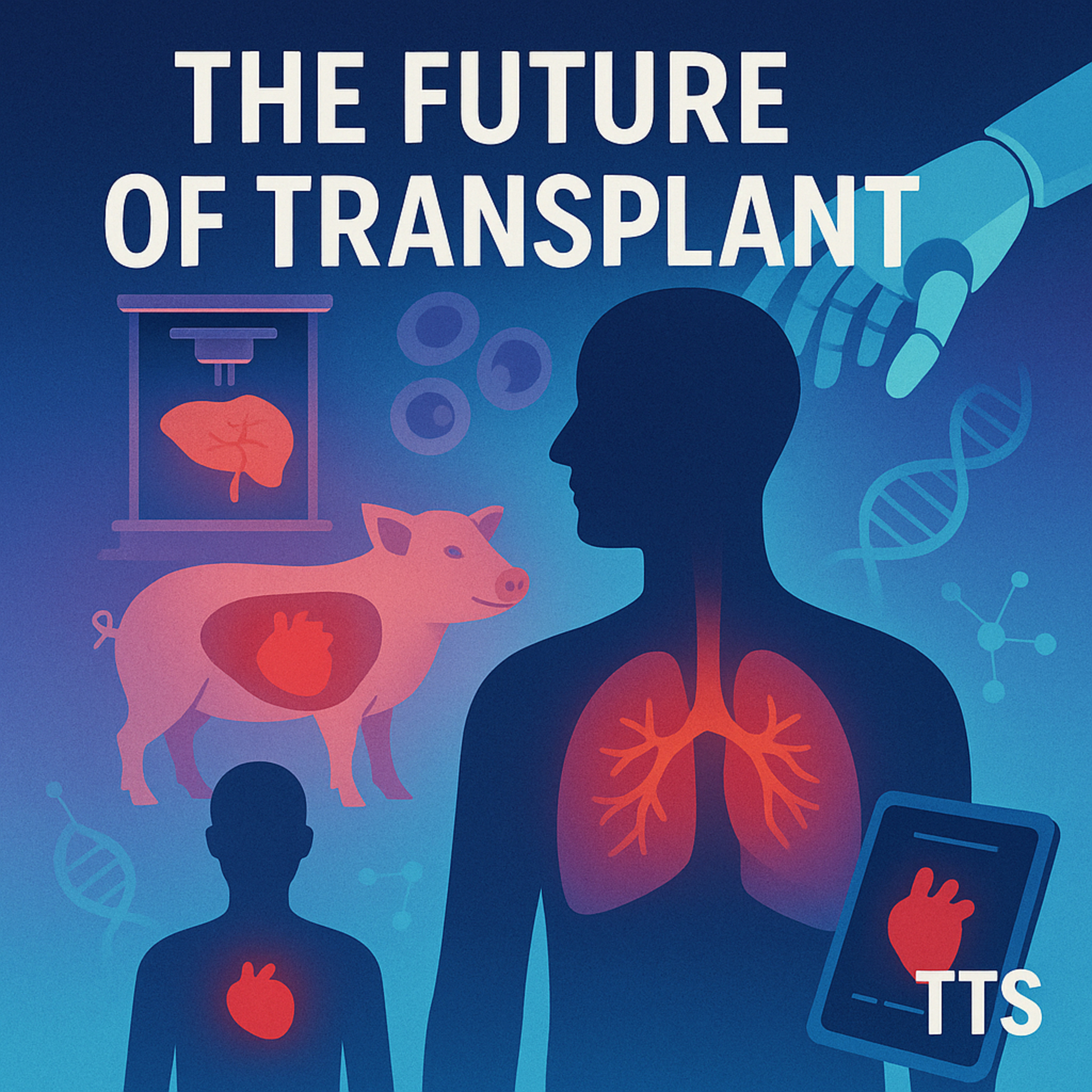
Trenches in Transplant SurgeryThe Future of Transplant (Organ Transplantation in 2050)By 2050, organ transplantation will be radically transformed—from a scarce, donor-dependent therapy into a diverse ecosystem of biological and technological solutions. Patients will receive organs from genetically engineered pigs, bioprinting labs, or even their own regenerated cells, while many others may avoid transplantation altogether through regenerative medicine, gene editing, and artificial organ implants. Advances in AI-driven allocation, precision medicine, and opt-out donation policies will expand access and efficiency, though disparities may persist between rich and poor regions. As bioengineered and artificial organs blur the boundaries between human, animal, and machine, the ethical, psychological, and cultural dimensions of identity, equity, an...
2025-10-3043 min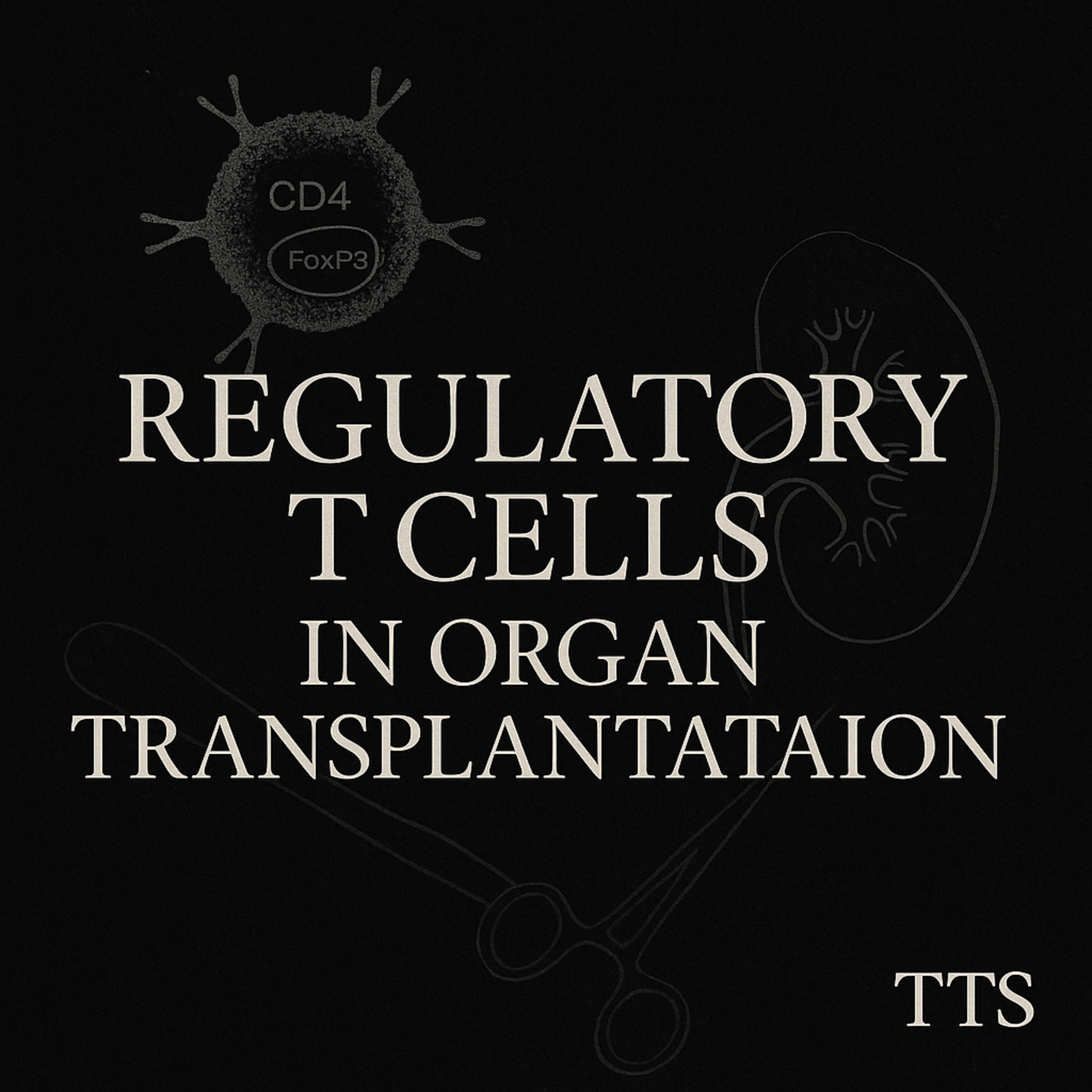
Trenches in Transplant SurgeryRegulatory T Cells in Organ TransplantationRegulatory T cells (Tregs)—discovered by Shimon Sakaguchi, Mary Brunkow, and Fred Ramsdell, who were awarded the 2025 Nobel Prize—are central to inducing immune tolerance and preventing organ transplant rejection. These CD4⁺FoxP3⁺ cells suppress alloimmune responses through multiple mechanisms (IL-10, TGF-β secretion; CTLA-4–mediated dendritic cell modulation; IL-2 consumption; cytotoxic effects on effector T cells). Clinically, higher Treg levels correlate with better graft survival and fewer rejection episodes. Early-phase trials in kidney and liver transplantation show that adoptive Treg infusions are safe, reduce acute rejection, and allow lowering of toxic immunosuppressive drugs. Approaches include polyclonal Tregs, donor-specific Tregs (darTregs...
2025-10-0741 min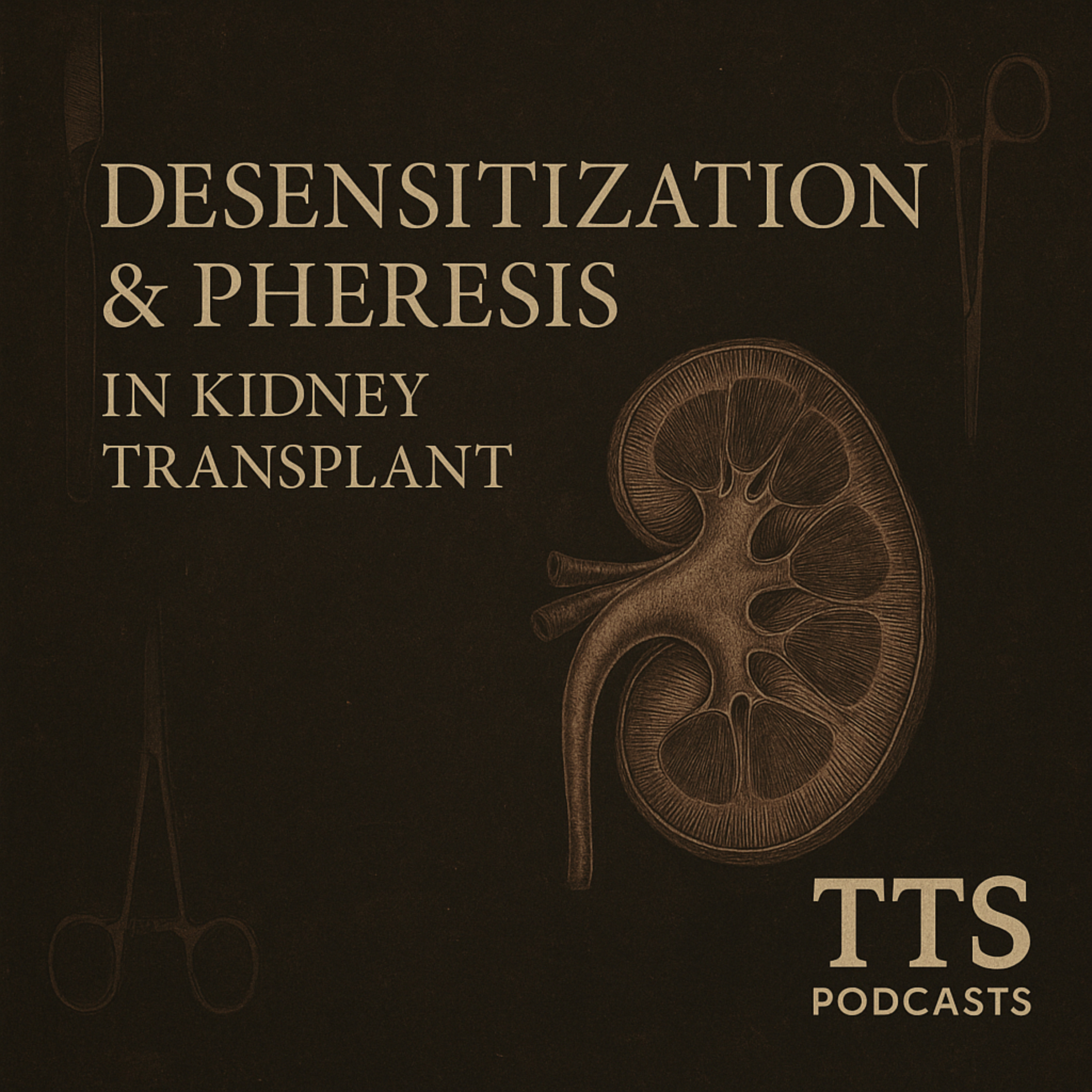
Trenches in Transplant SurgeryDesensitization and Pheresis in Kidney TransplantDesensitization has transformed kidney transplantation for patients with high immunologic risk by lowering or removing antibodies that would otherwise cause graft loss. Pre- and peri-transplant plasmapheresis (therapeutic plasma exchange) with low-dose intravenous immunoglobulin (IVIG), sometimes combined with B-cell depletion (rituximab) or newer agents (imlifidase, bortezomib, daratumumab), is standard for HLA- or ABO-incompatible living and deceased donor transplants. Plasmapheresis is also first-line therapy for antibody-mediated rejection and for recurrent focal segmental glomerulosclerosis (FSGS), where early, intensive sessions can induce remission; resistant cases may benefit from lipoprotein apheresis. Highly sensitized patients are identified by elevated panel reactive antibody (PRA/cPRA) levels...
2025-10-0356 min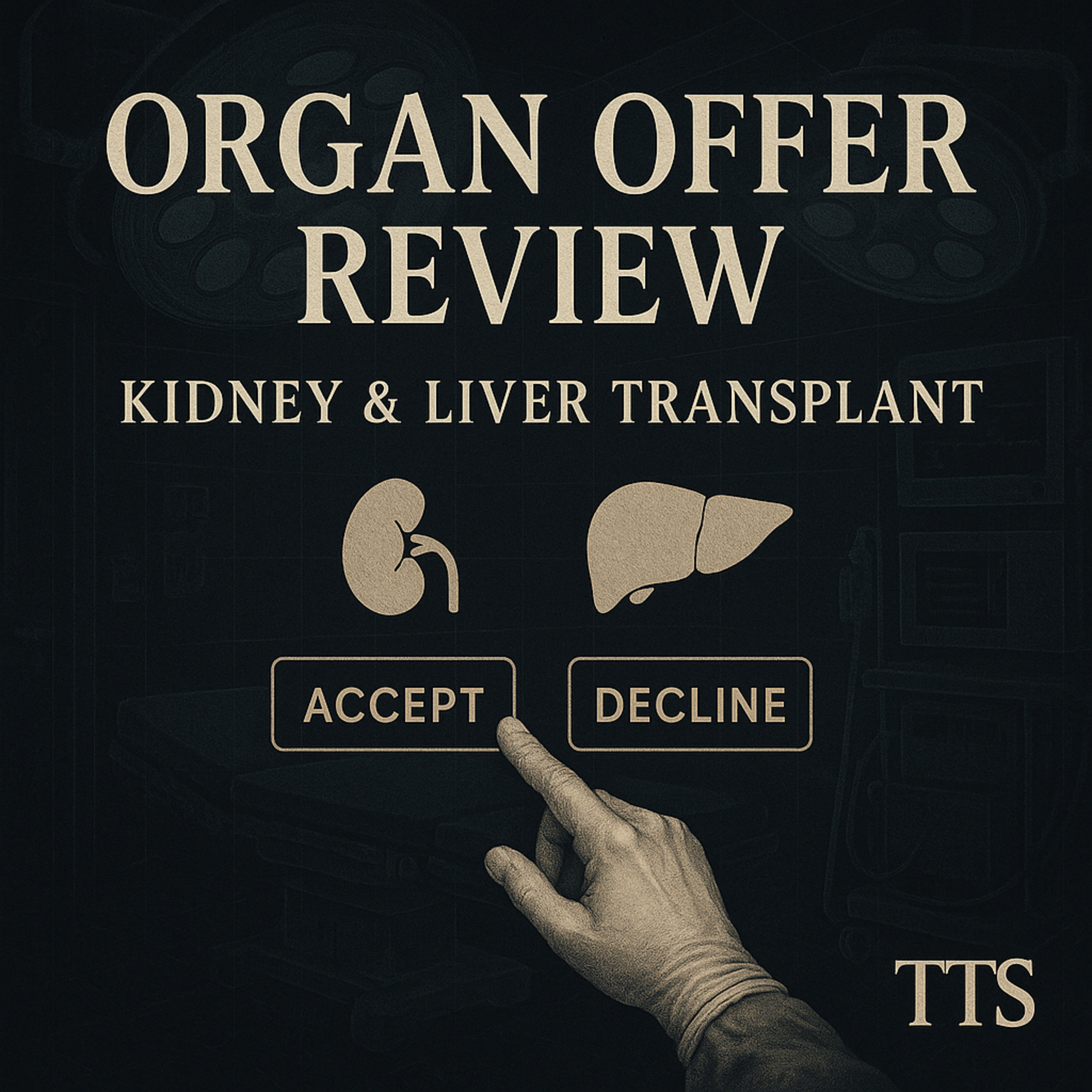
Trenches in Transplant SurgeryOrgan Offer Review - Kidney and Liver TransplantWhen a deceased-donor offer arrives, the on-call surgeon rapidly weighs donor organ quality, recipient need, and logistics within OPTN/UNOS policy. For kidneys, decisions hinge on KDPI, creatinine/AKI course, machine-pump metrics, procurement biopsy (e.g., glomerulosclerosis/arteriosclerosis), HLA antibodies/virtual or physical crossmatch, and the patient’s wait time/sensitization; kidneys tolerate longer cold ischemia and can be deferred a few hours if needed. For livers, the focus is MELD/urgency, donor stability (pressors/arrest), DCD status and warm ischemia, steatosis by appearance/biopsy, extreme transaminases, size match, and the ability to transplant quickly (short cold time ± normothermic per...
2025-10-0239 min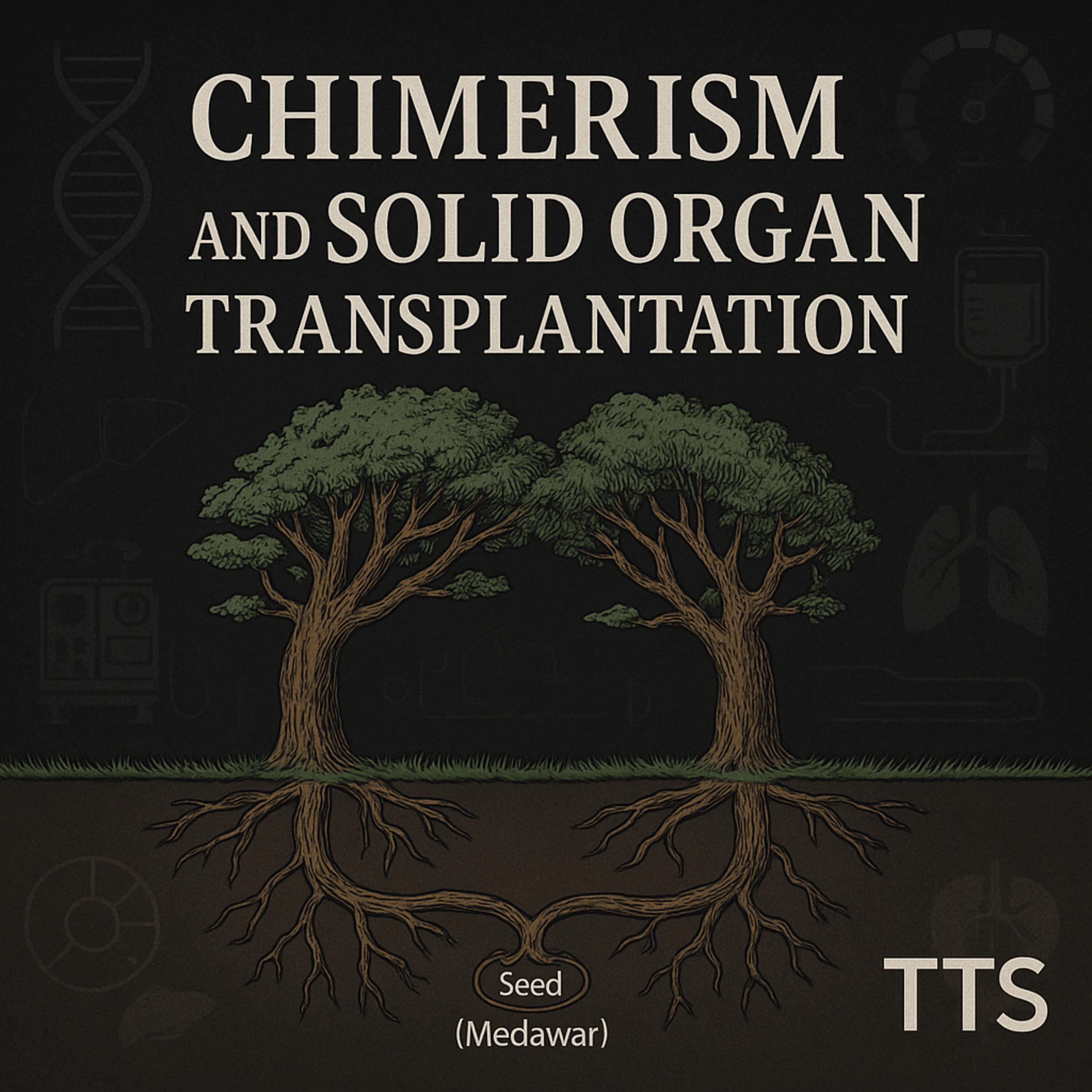
Trenches in Transplant SurgeryChimerism and Solid Organ TransplantationChimerism—the coexistence of donor and recipient hematopoietic cells—has become central to understanding and inducing immune tolerance in solid organ transplantation. Early work by Owen, Medawar, and later Starzl revealed that donor “passenger leukocytes” can persist as microchimerism in recipients, reshaping the once one-way host-versus-graft paradigm into a bidirectional model. Stable mixed chimerism can induce central and peripheral tolerance by deleting or regulating donor-reactive lymphocytes, while microchimerism may help sustain long-term graft acceptance but is not uniformly protective. Clinical trials combining kidney or liver transplants with donor stem cell infusions have shown that mixed or even transient chimerism can allo...
2025-10-0148 min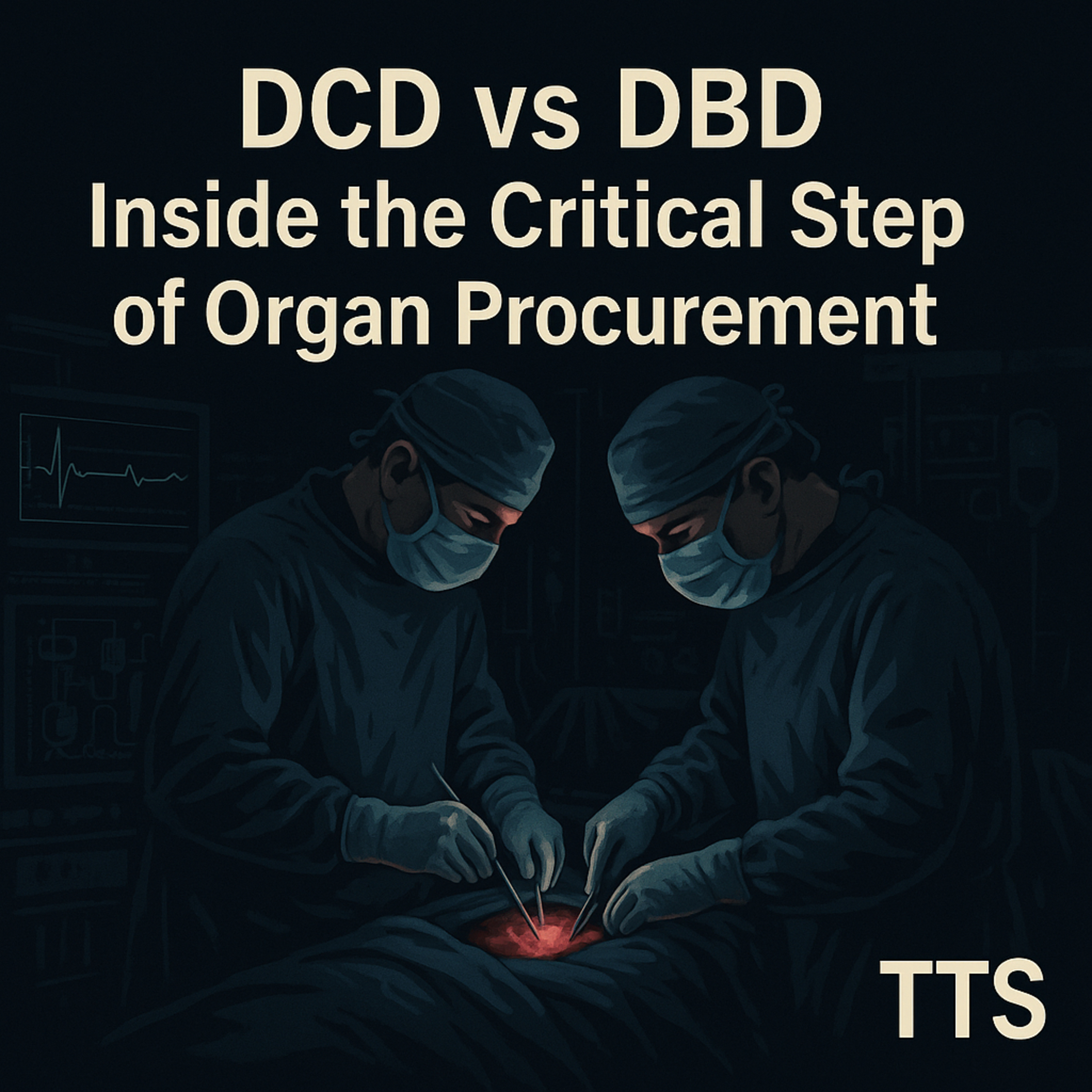
Trenches in Transplant SurgeryDCD vs DBD — Inside the Critical Step of Organ ProcurementFollowing a recent New York Times report that questioned the ethics and safety of donation after circulatory death (DCD), this episode clarifies how DCD and donation after brain death (DBD) actually work in U.S. organ procurement. We explain why DCD now accounts for ~43% of deceased donors (≈7,300 in 2024, 13,496 transplants) and how it complements the ~9,700 brain-dead donors who still provide most organs. We explore the surgical, ethical, and logistical safeguards that make procurement safe and trustworthy, the innovations (machine perfusion, NRP) that expand DCD use, and why expert procurement is the critical bridge that preserves organ quality, upholds public trust, an...
2025-09-2842 min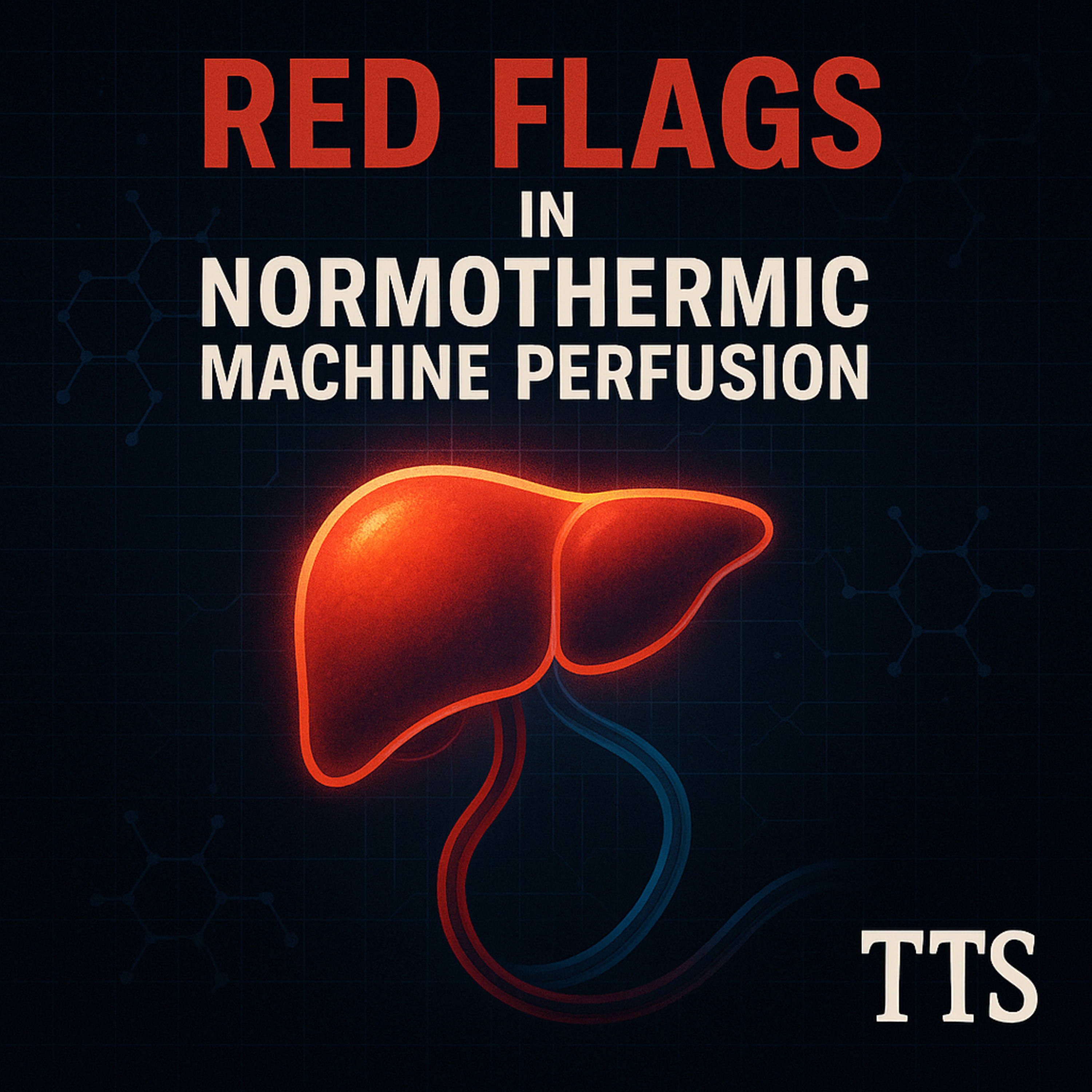
Trenches in Transplant SurgeryRed Flags in Normothermic Machine PerfusionDuring normothermic machine perfusion (NMP), several red flags may prompt declining a liver for transplantation. The most critical biochemical warning is failure to clear lactate to 6000 IU/L) reflect ongoing hepatocellular injury. Perfusion parameters such as low hepatic artery (
2025-08-2525 min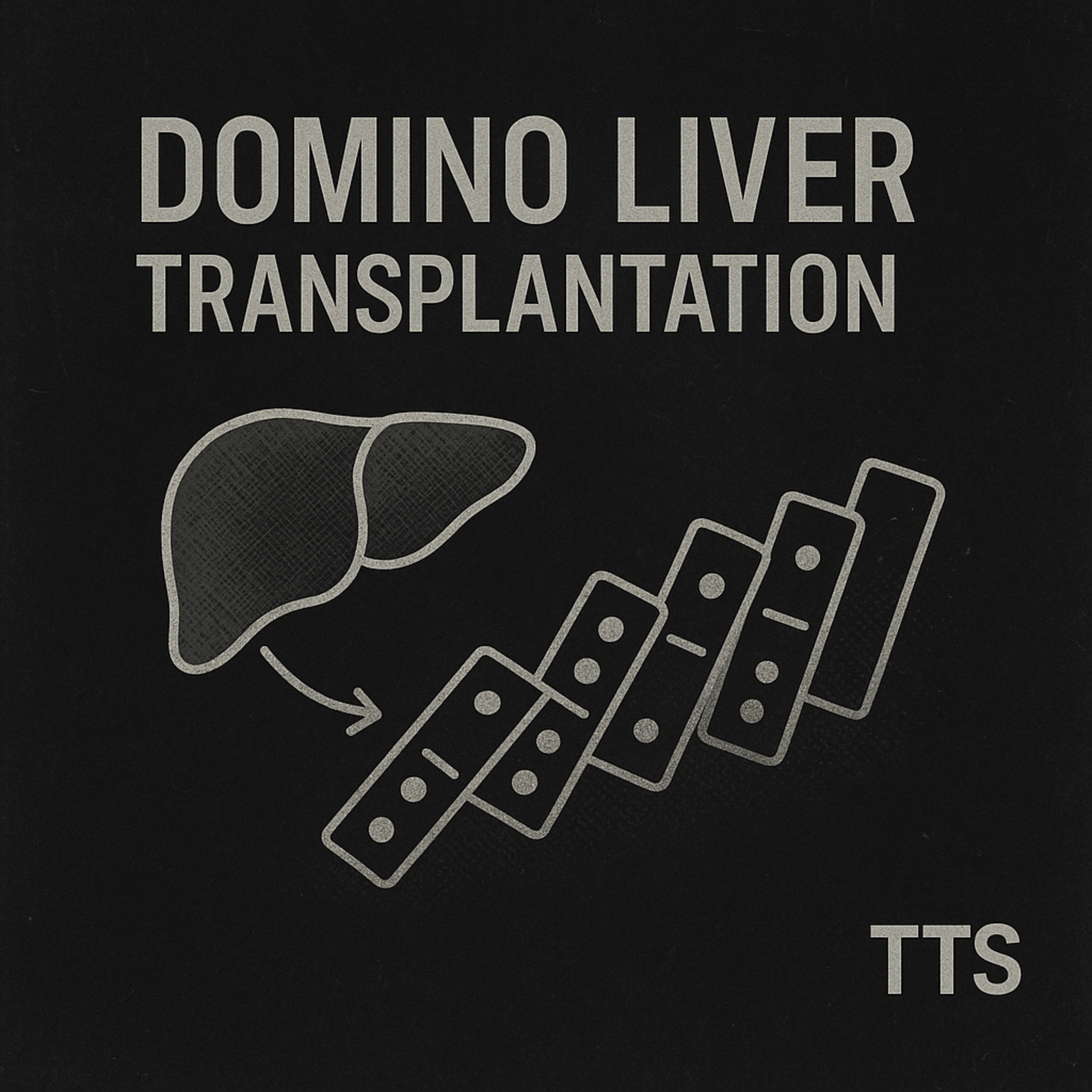
Trenches in Transplant SurgeryDomino Liver TransplantationDomino liver transplantation is a unique and innovative surgical strategy designed to expand the donor organ pool by utilizing the explanted liver from a patient with a non-cirrhotic metabolic liver disease—such as familial amyloid polyneuropathy or maple syrup urine disease—as a graft for a second recipient. While the donor liver carries a genetic or enzymatic defect, it remains structurally and functionally normal, and the recipient is carefully selected to minimize the risk or impact of the transmitted condition. Since its introduction in the mid-1990s, this technique has demonstrated excellent outcomes with comparable graft and patient survival to s...
2025-08-1634 min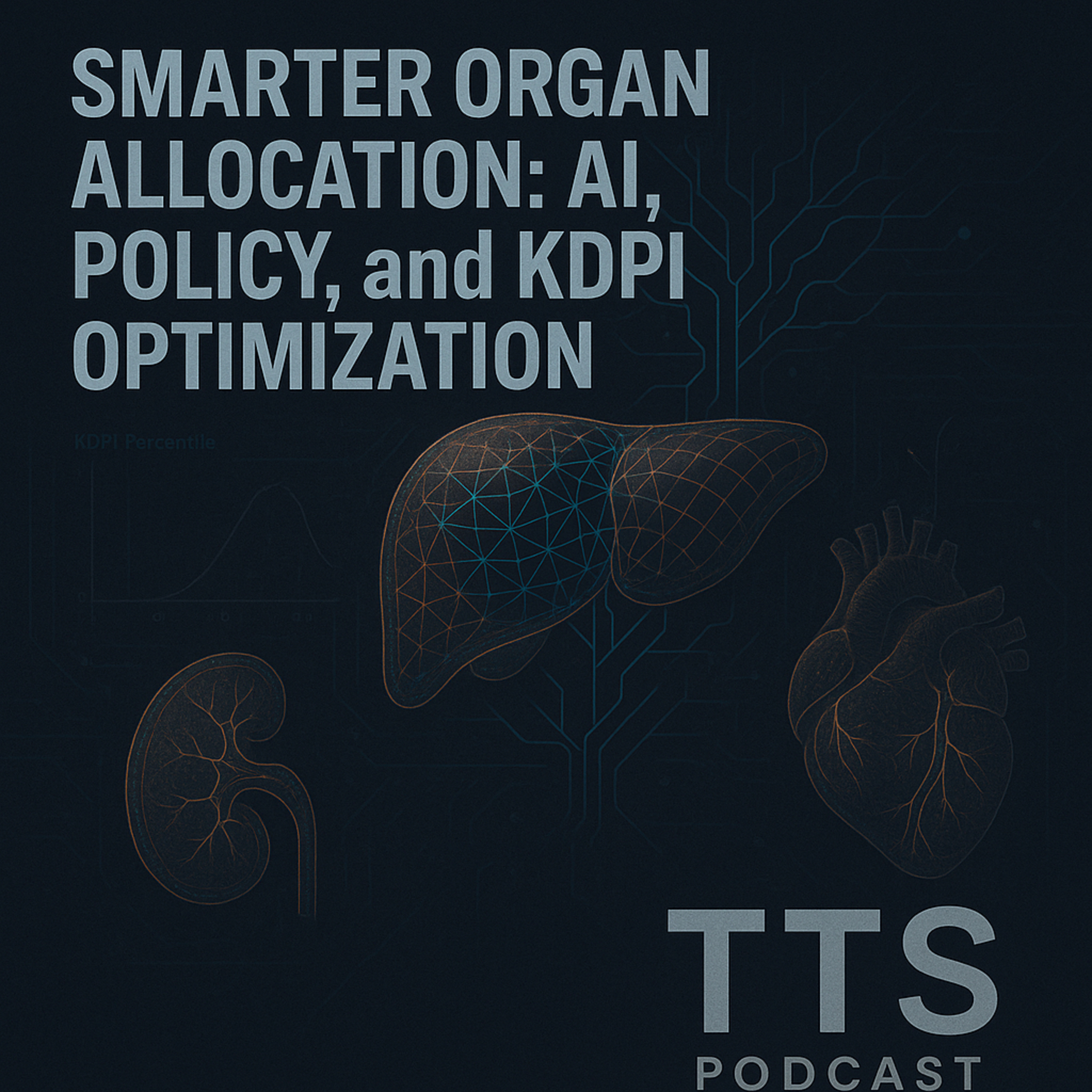
Trenches in Transplant SurgerySmarter Organ Allocation - AI, Policy, and KDPI OptimizationThis episode of TTS Podcast explores “Smarter Organ Allocation: AI, Policy, and KDPI Optimization”, focusing on how recent U.S. policy reforms like continuous distribution, kidney expedited placement protocols, and updated scoring systems (KDPI, EPTS, MELD 3.0) are reshaping transplant equity and efficiency. It examines cutting-edge AI applications in donor-recipient matching, survival prediction, and real-time decision support, alongside integration with electronic health records and predictive analytics tools. By merging data-driven models with evolving allocation frameworks, these innovations aim to maximize graft utility, reduce organ discard, and ensure fairer access across all organ types, marking a transformative era in transplantation.
2025-08-1422 min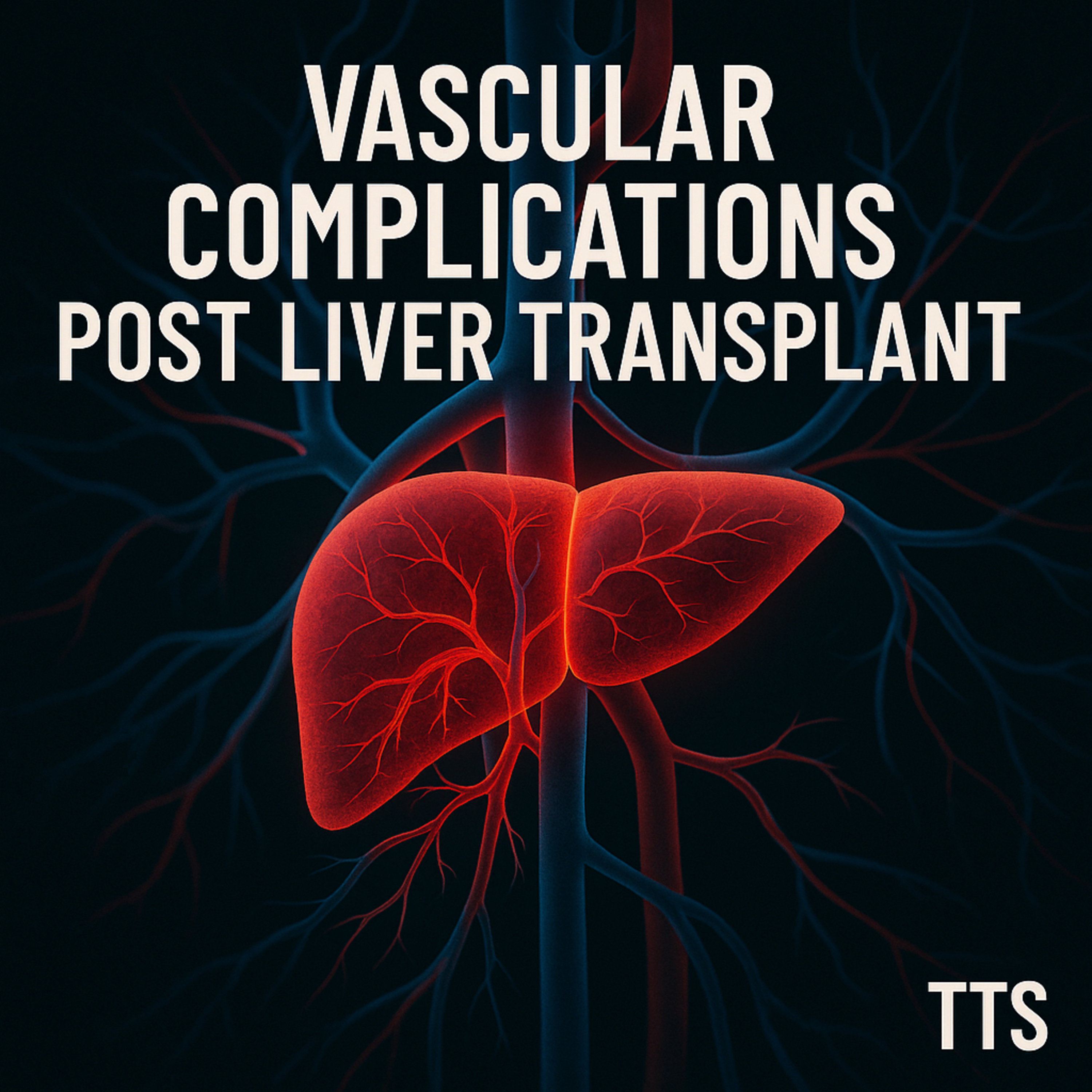
Trenches in Transplant SurgeryVascular complications after liver transplantation – HAT, HVOO, and PVTVascular complications after liver transplantation – HAT, HVOO, and PVT – though infrequent, demand a high index of suspicion and aggressive management. Early Doppler ultrasound monitoring and prompt imaging are essential to detect these complications in their nascent stages. Advances in surgical techniques and interventional radiology have significantly improved outcomes: for example, timely IR procedures now salvage many grafts that previously would have been lost. Multidisciplinary care, involving transplant surgeons, hepatologists, interventional radiologists, and intensive care specialists, is required to optimize results. Moreover, preventive strategies – from meticulous surgical anastomoses to prophylactic anticoagulation in high-risk patients – are increasingly recognized as crucial in minimizi...
2025-08-1141 min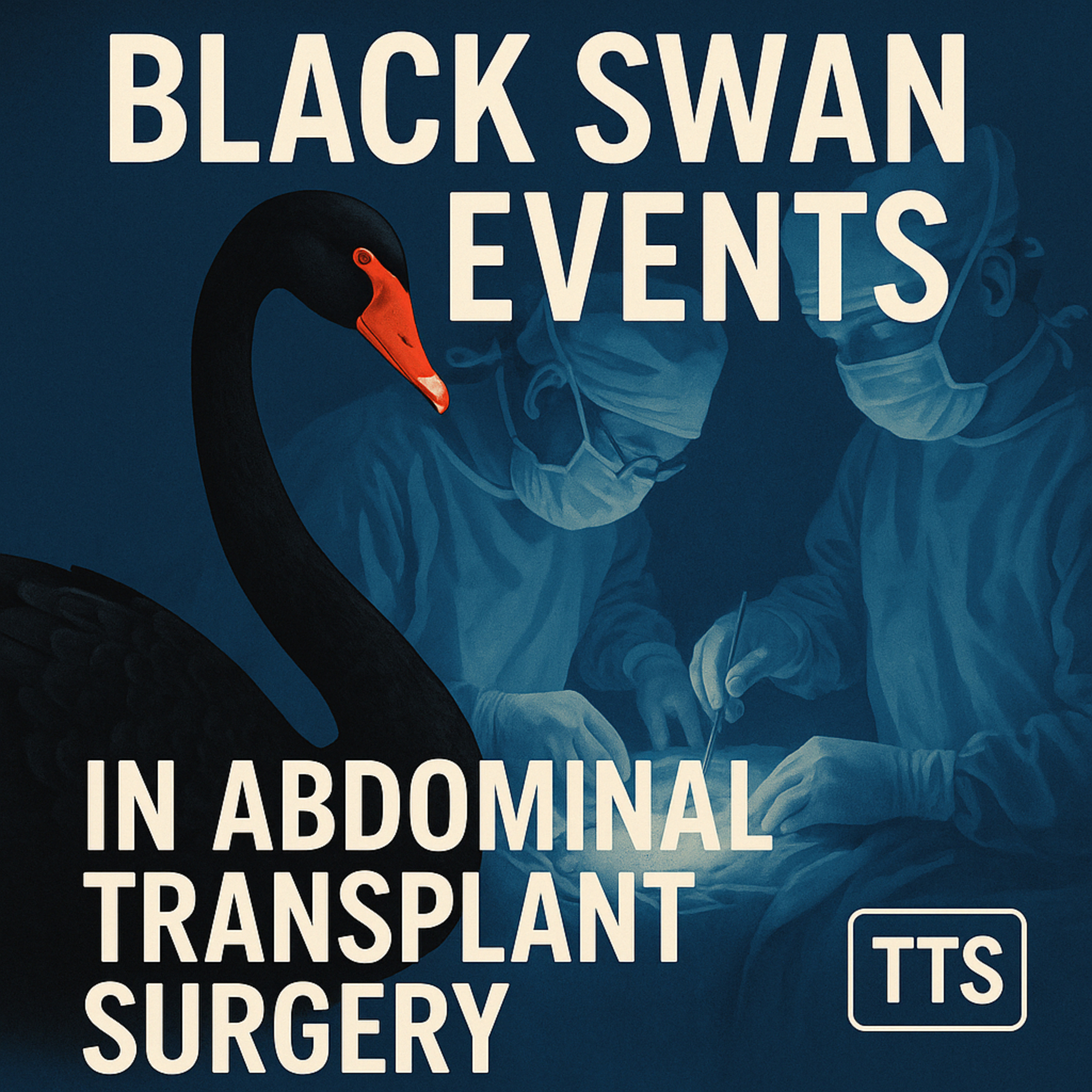
Trenches in Transplant SurgeryBlack Swan Events in Organ Transplant SurgeryRecent “black swan” developments in abdominal transplant surgery have reshaped the field through rare, unexpected events with major impact. These include the unprecedented success of a gene-edited pig kidney functioning in a human for over 60 days, breakthroughs in normothermic machine perfusion and extracorporeal pig liver support, and daring multi-organ transplants such as a triple lung-liver-kidney operation and a combined liver transplant with a Whipple procedure for cholangiocarcinoma. Simultaneously, rare complications like donor-derived rabies and unexpected transplant-transmitted cancers have highlighted ongoing risks and driven protocol refinements. Collectively, these events have expanded the boundaries of what’s possible while reinforcing the need f...
2025-08-0415 min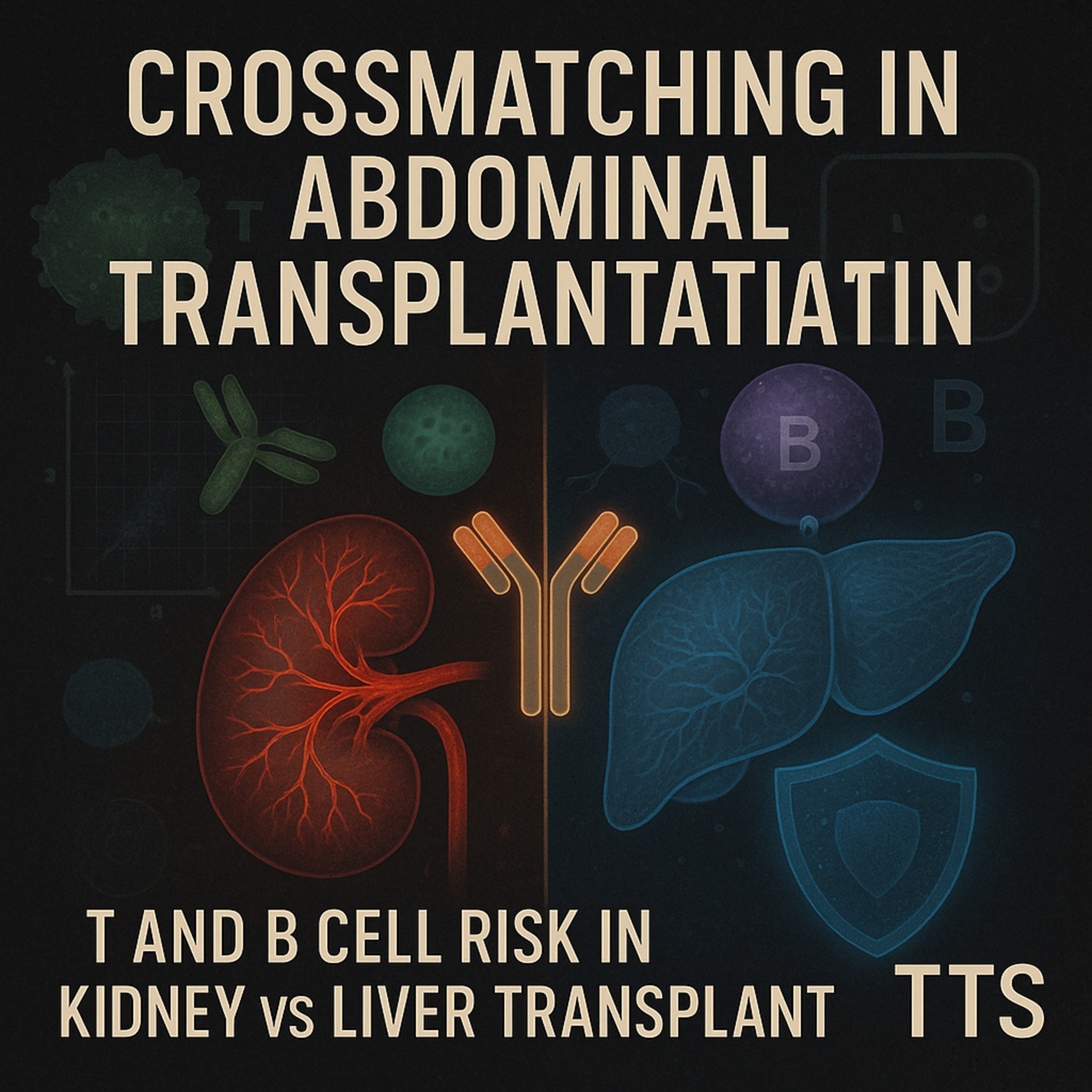
Trenches in Transplant SurgeryCrossmatching in Abdominal Transplantation - Understanding T and B Cell RiskIn this episode, we explore the science and clinical importance of crossmatching in abdominal organ transplantation—focusing on kidney and liver grafts. We delve into the key differences between T cell and B cell crossmatches, examining the roles of complement-dependent cytotoxicity (CDC) and flow cytometry in detecting donor-specific antibodies (DSAs). While a positive T cell crossmatch—particularly in kidney transplantation—often signifies a prohibitive immunologic risk due to class I HLA antibodies and hyperacute rejection, B cell crossmatches reveal subtler threats like class II DSAs. We contrast the high-stakes sensitivity of crossmatching in kidney transplantation with the liver’s immunolo...
2025-07-2725 min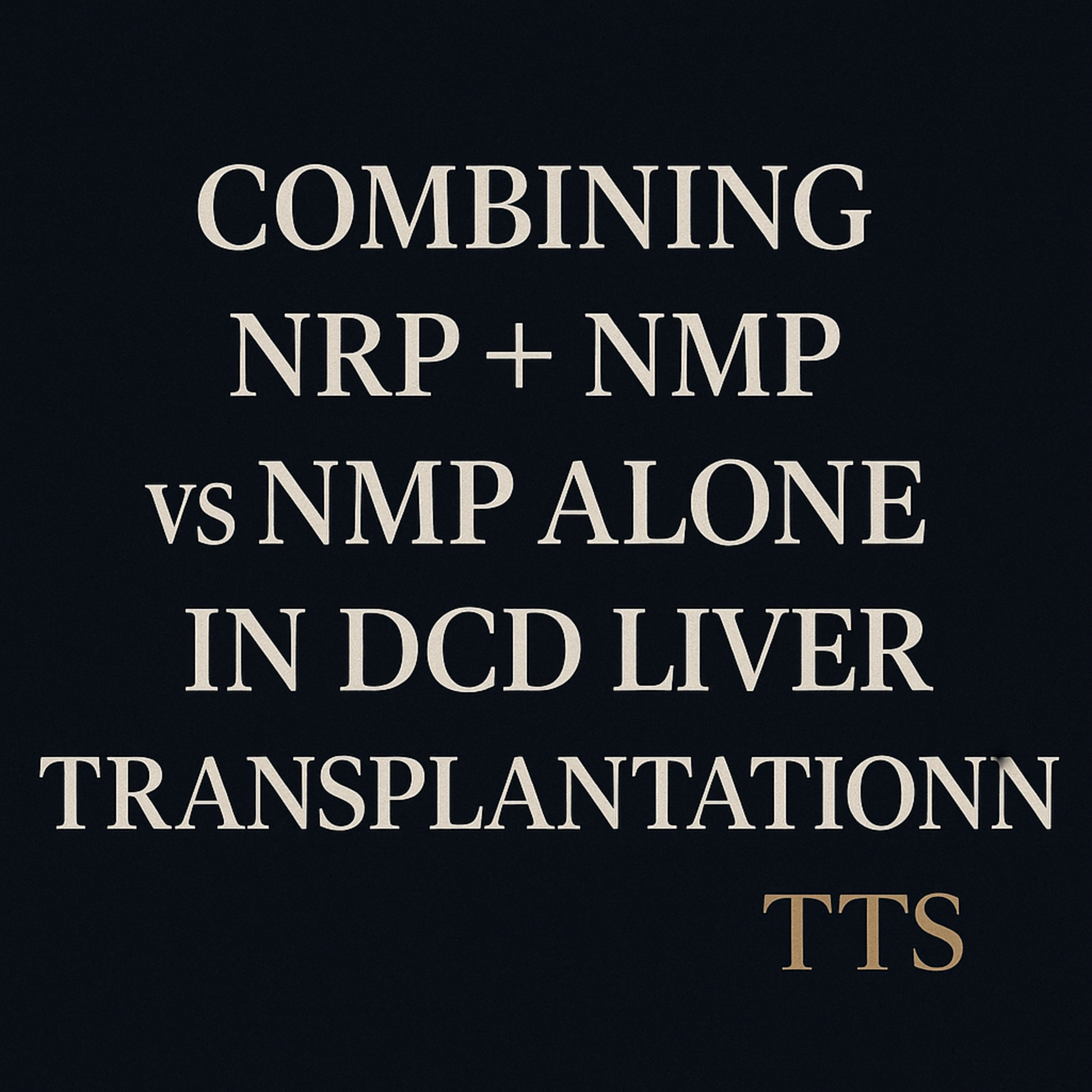
Trenches in Transplant SurgeryCombining NRP and NMP vs NMP Alone in DCD Liver TransplantationCombining Normothermic Regional Perfusion (NRP) with Normothermic Machine Perfusion (NMP) in DCD liver transplantation offers synergistic benefits over NMP alone by providing both early in-situ resuscitation and ex-situ viability assessment. While NMP alone improves early graft function and logistics, it does not fully prevent ischemic cholangiopathy (IC); in contrast, NRP—by rapidly restoring oxygenated blood flow in the donor—virtually eliminates IC and significantly enhances biliary outcomes. Together, NRP+NMP yields superior graft survival, lower complication rates, and expanded use of marginal livers, including those from elderly donors or with long transport times. Though more resource-intensive, this sequential approach maxi...
2025-07-2628 min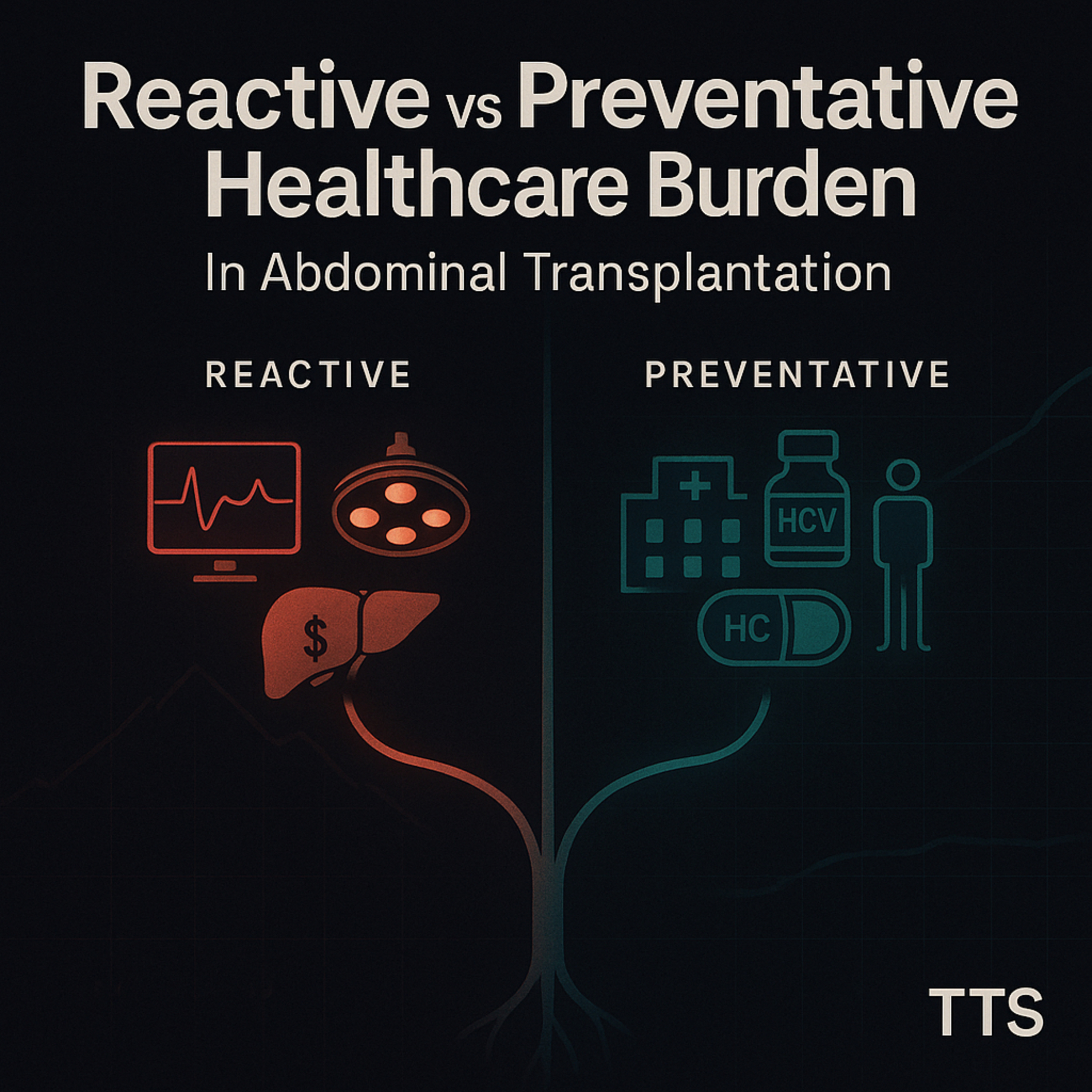
Trenches in Transplant SurgeryReactive vs. Preventative Care Burden in Abdominal Organ TransplantationReactive care for abdominal organ failure—through costly interventions like liver, kidney, pancreas, and multivisceral transplants—imposes a substantial healthcare burden in the U.S., with first-year costs ranging from $400,000 to over $2 million per case, plus significant long-term expenses and productivity losses. While transplantation improves survival and can be cost-effective (especially kidney vs. dialysis), it remains a late-stage solution. In contrast, preventative care—including chronic disease management, hepatitis C treatment, obesity and alcohol intervention, and early screening—has shown the ability to reduce organ failure incidence, improve patient outcomes, and lower aggregate costs over time. Historical trends reveal that while so...
2025-07-2417 min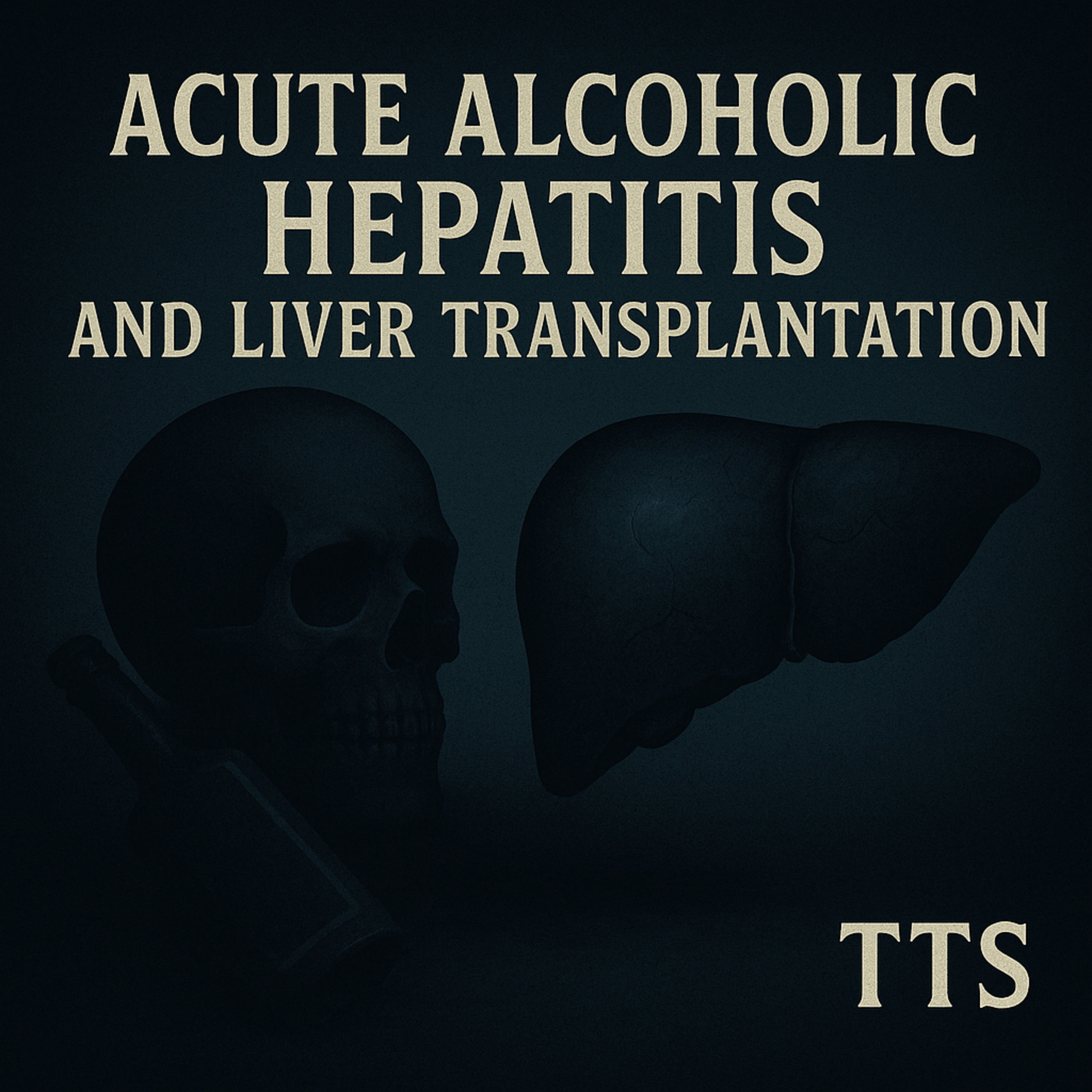
Trenches in Transplant SurgeryAcute Alcoholic Hepatitis and Liver TransplantationSevere acute alcoholic hepatitis (AAH), characterized by high short-term mortality (exceeding 75% at 6 months) in patients failing corticosteroid therapy (Lille score >0.45), represents a paradigm shift in liver transplantation, moving from historical contraindication to a potentially life-saving intervention for highly selected candidates. Landmark studies, notably Mathurin et al. (2011), demonstrated dramatically improved survival (70-85% at 5 years) with early LT compared to medical management alone in rigorously selected steroid-nonresponsive patients experiencing their *first* episode of decompensation. Crucially, strict selection criteria waive the traditional 6-month sobriety rule but mandate a definitive AAH diagnosis, confirmed steroid non-response, absence of severe comorbidities, and, most importantly, an...
2025-07-2018 min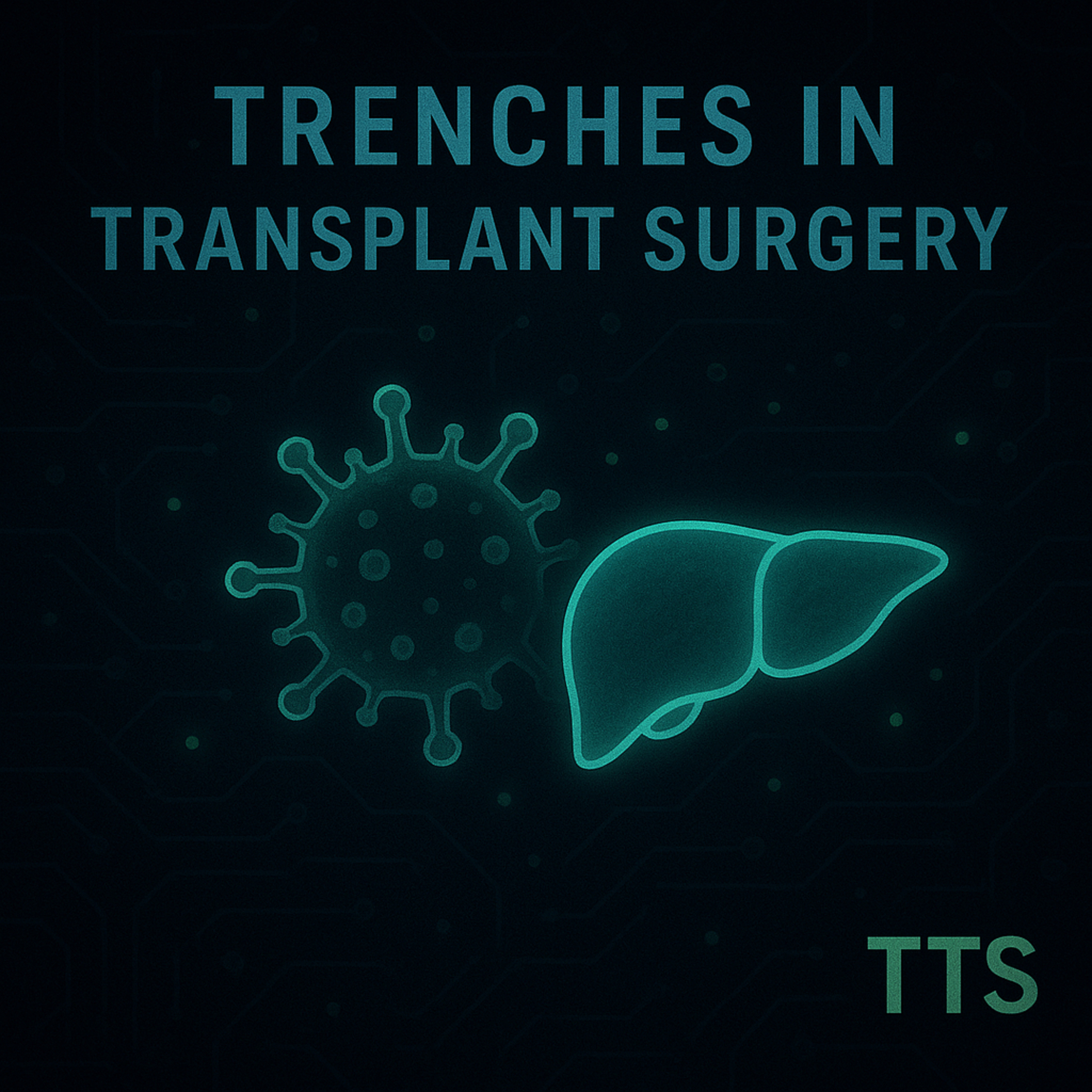
Trenches in Transplant SurgeryEvolving Contraindications and Management Strategies for Infectious Diseases in Deceased Organ DonationThe critical organ shortage has driven a paradigm shift in utilizing deceased donors with infectious diseases, transforming many historical absolute contraindications into relative ones through advanced diagnostics and targeted therapies. While universally fatal or untreatable infections like active rabies, prion diseases, untreated disseminated fungal infections, or multidrug-resistant sepsis remain absolute contraindications, most infections now undergo rigorous risk-benefit analysis. Groundbreaking management strategies, particularly the advent of direct-acting antivirals (DAAs), enable the routine and safe use of hepatitis C viremic donors, achieving >95% cure rates in recipients. Similarly, refined protocols allow hepatitis B core antibody-positive donors with nucleos(t)ide analogue prophylaxis...
2025-07-1620 min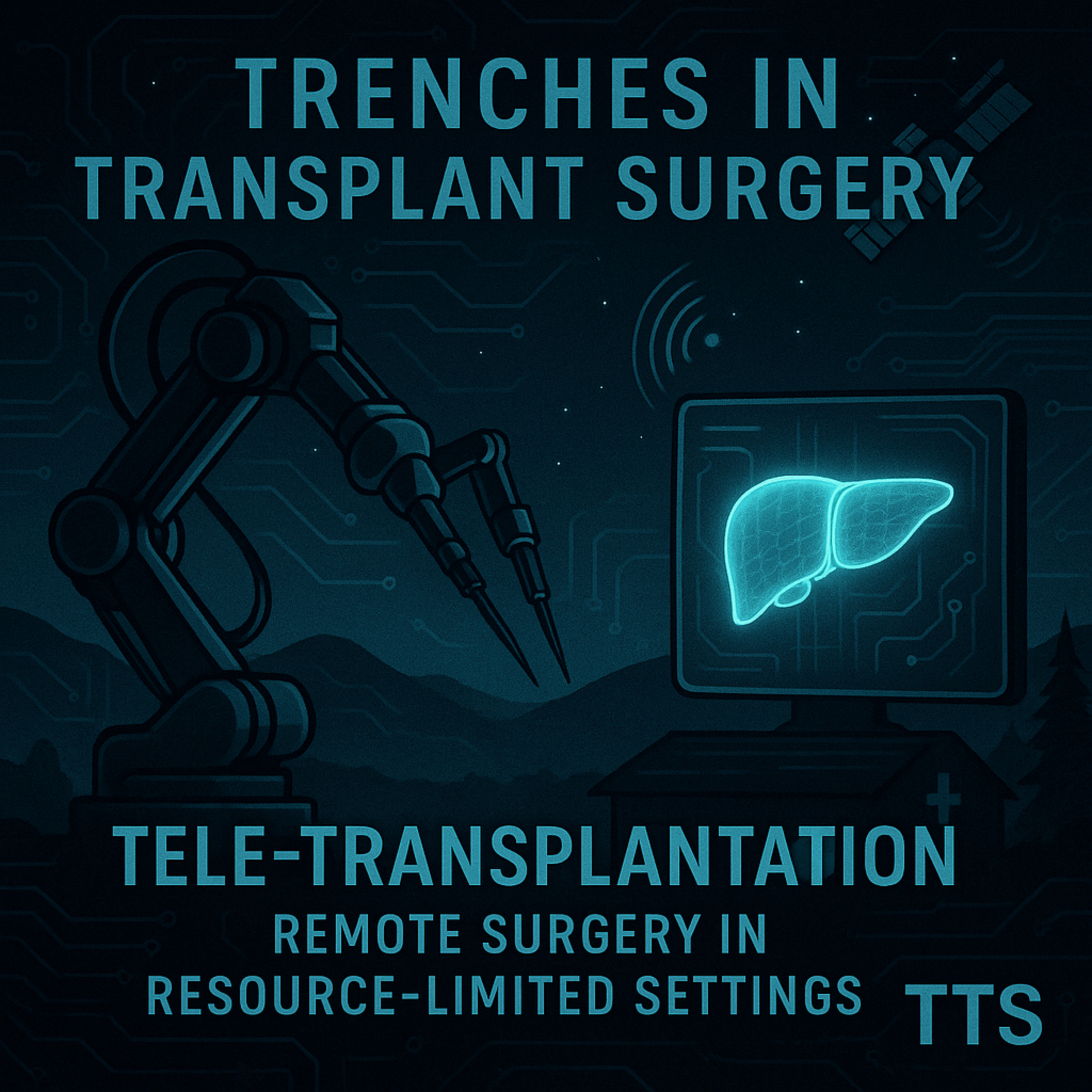
Trenches in Transplant SurgeryTele-Transplantation for Resource Limited SettingsTele-transplantation in RLS currently relies overwhelmingly on tele-mentoring (remote expert guidance via video link), as pure robotic telesurgery remains technologically and financially unfeasible due to prohibitive costs, unreliable ultra-low-latency connectivity, and lack of affordable robotic systems. Successful case studies, like kidney transplant mentoring between India and the UK or foundational surgical training in Malawi, demonstrate that tele-mentoring can effectively bridge expertise gaps, build local capacity, and improve perioperative care when paired with skilled on-site teams. While innovations in simplified task-specific robotics, AI-assisted guidance (e.g., AR overlays, anatomy recognition), and optimized satellite connectivity offer future potential to augment specific...
2025-07-1416 min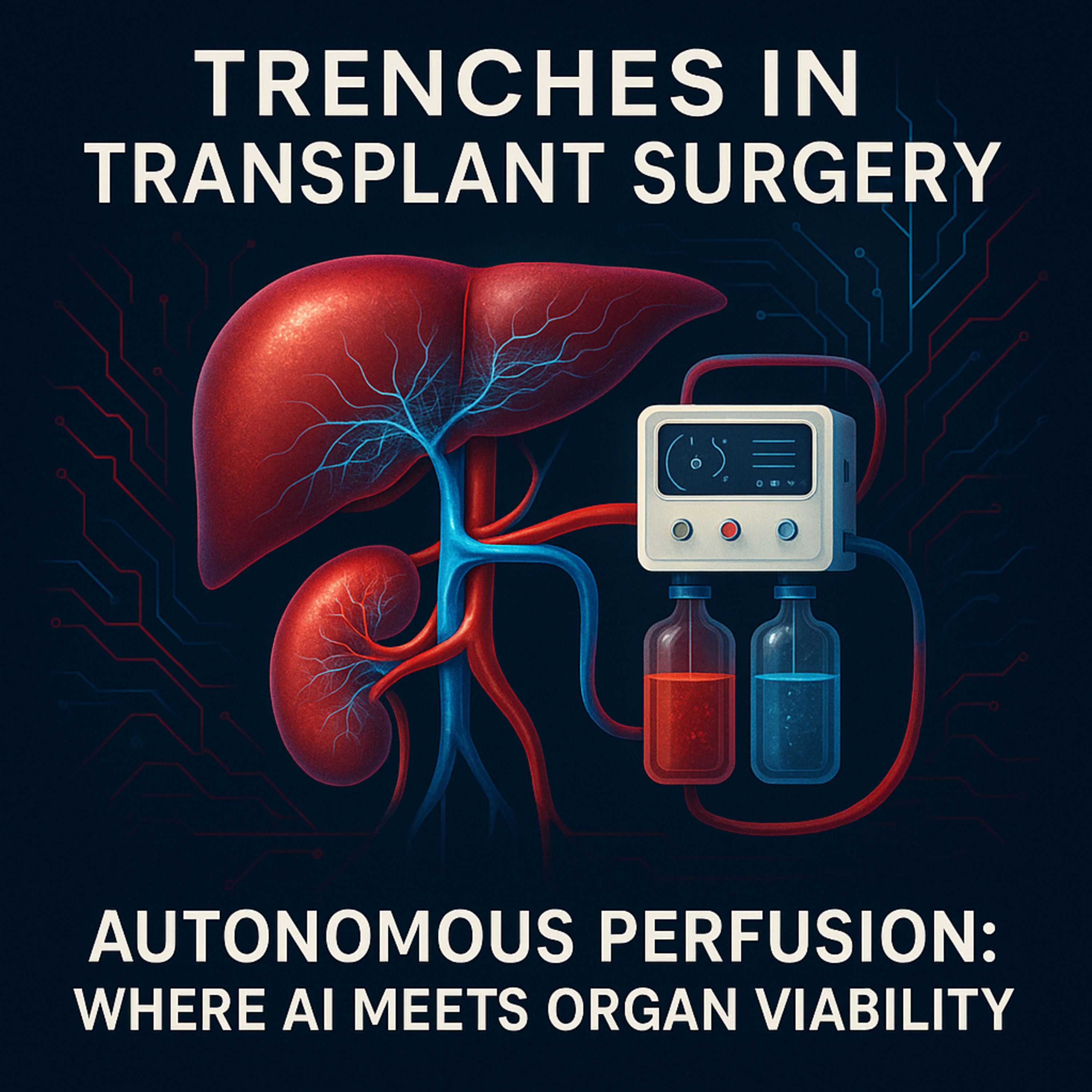
Trenches in Transplant SurgeryAutonomous Perfusion - Where AI Meets Organ ViabilityAutonomous perfusion systems powered by machine learning represent a transformative advancement in organ preservation and tissue engineering. By integrating real-time sensor data with adaptive AI algorithms—such as reinforcement learning, Gaussian processes, and predictive modeling—these systems dynamically adjust perfusion parameters to optimize oxygenation, nutrient delivery, and waste removal. This closed-loop control enables precise, consistent, and prolonged ex vivo organ maintenance, reducing manual oversight and enhancing viability, especially for marginal grafts. From microfluidic organ-on-chip platforms to large-scale bioreactors, the convergence of AI and perfusion technology promises to revolutionize both research and clinical transplantation.
2025-07-1322 min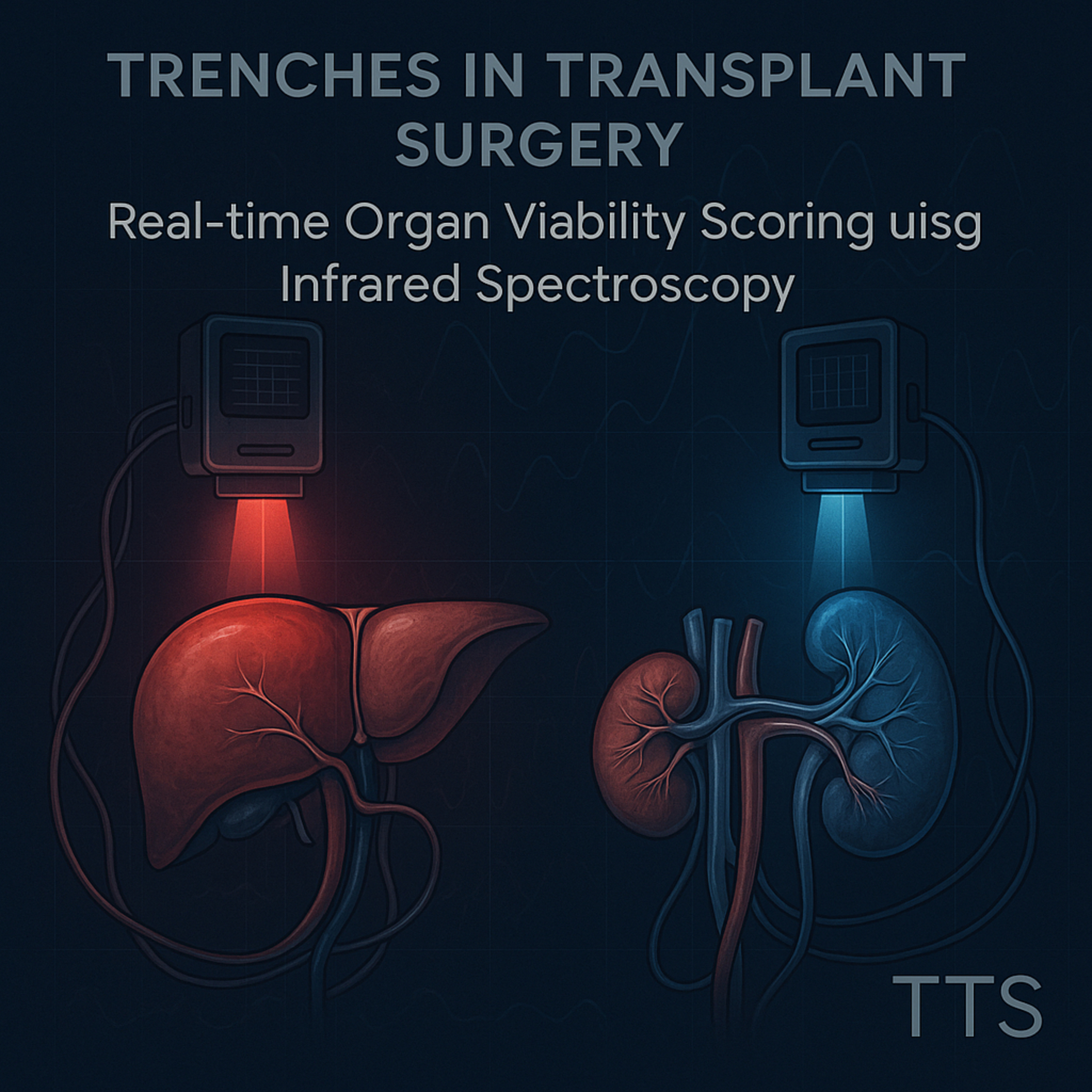
Trenches in Transplant SurgeryInfrared Spectroscopy for Organ Viability AssessmentInfrared spectroscopy, including both near-infrared (NIR) and mid-infrared (MIR) modalities, is emerging as a powerful, non-invasive tool for real-time organ viability assessment in transplantation. NIR spectroscopy has been applied to monitor perfusion and oxygenation in kidney and liver grafts during surgery and preservation, with studies showing strong correlations between spectral features and clinical viability markers such as Doppler indices or histological fibrosis. MIR techniques, like ATR-FTIR and microspectroscopy, offer chemically specific insights—especially in quantifying liver steatosis and fibrosis—enabling rapid, point-of-care evaluation of donor organs. Despite promising results, current applications are largely experimental, with challenges including tissue heterogeneity, limi...
2025-07-1118 min
Trenches in Transplant SurgeryVirtual Reality in Organ Transplant TrainingImmersive VR training modules for liver and kidney transplantation are emerging as powerful tools in surgical education, combining anatomical accuracy, procedural simulation, and collaborative learning. Academic institutions such as Lawrence Livermore National Lab and Otto-von-Guericke University have developed VR platforms that simulate complex procedures like laparoscopic liver resections and kidney transplants, incorporating haptic feedback, real-time team interaction, and patient-specific 3D anatomy. Studies show VR enhances spatial understanding, technical skill acquisition, and decision-making, with early validation suggesting improved anatomical comprehension and user satisfaction. Though still in pilot stages, these modules are increasingly integrated into academic hospitals and transplant training programs...
2025-07-1024 min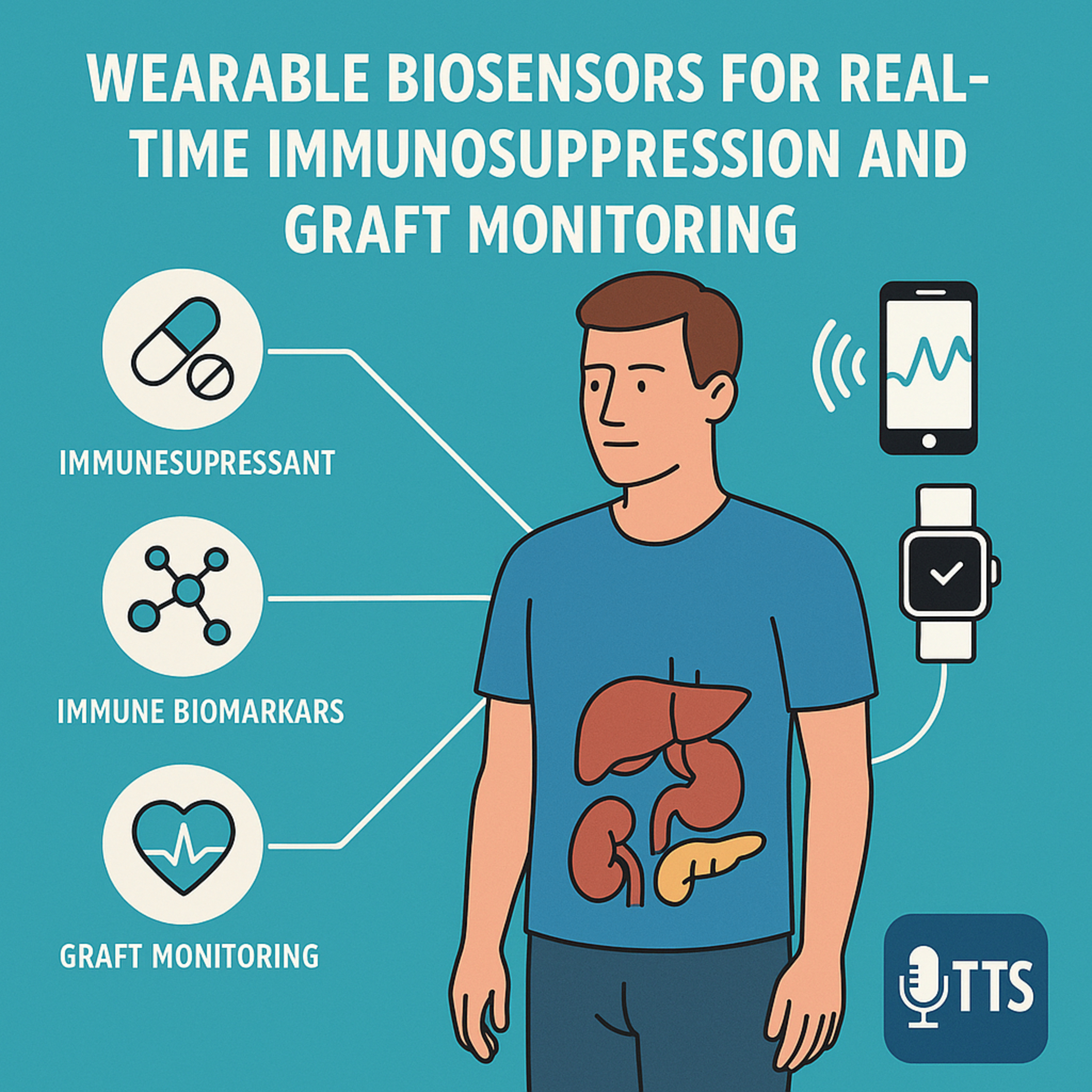
Trenches in Transplant SurgeryWearable Biosensors for Transplant CareWearable biosensors are emerging as transformative tools for real-time immunosuppression and graft monitoring in abdominal organ transplantation. These devices—ranging from sweat and interstitial fluid sensors to subcutaneous and implantable platforms—can detect key biomarkers such as tacrolimus levels, cytokines, CRP, creatinine, and tissue oxygenation. By integrating with mobile apps and cloud-based dashboards, they enable continuous, non-invasive monitoring that may help detect early rejection, infection, or drug toxicity. Though still largely in prototype or early clinical stages, these technologies promise to shift post-transplant care from reactive, clinic-based models to proactive, personalized management. Challenges remain, including biocompatibility, analytical accuracy, and pati...
2025-07-0919 min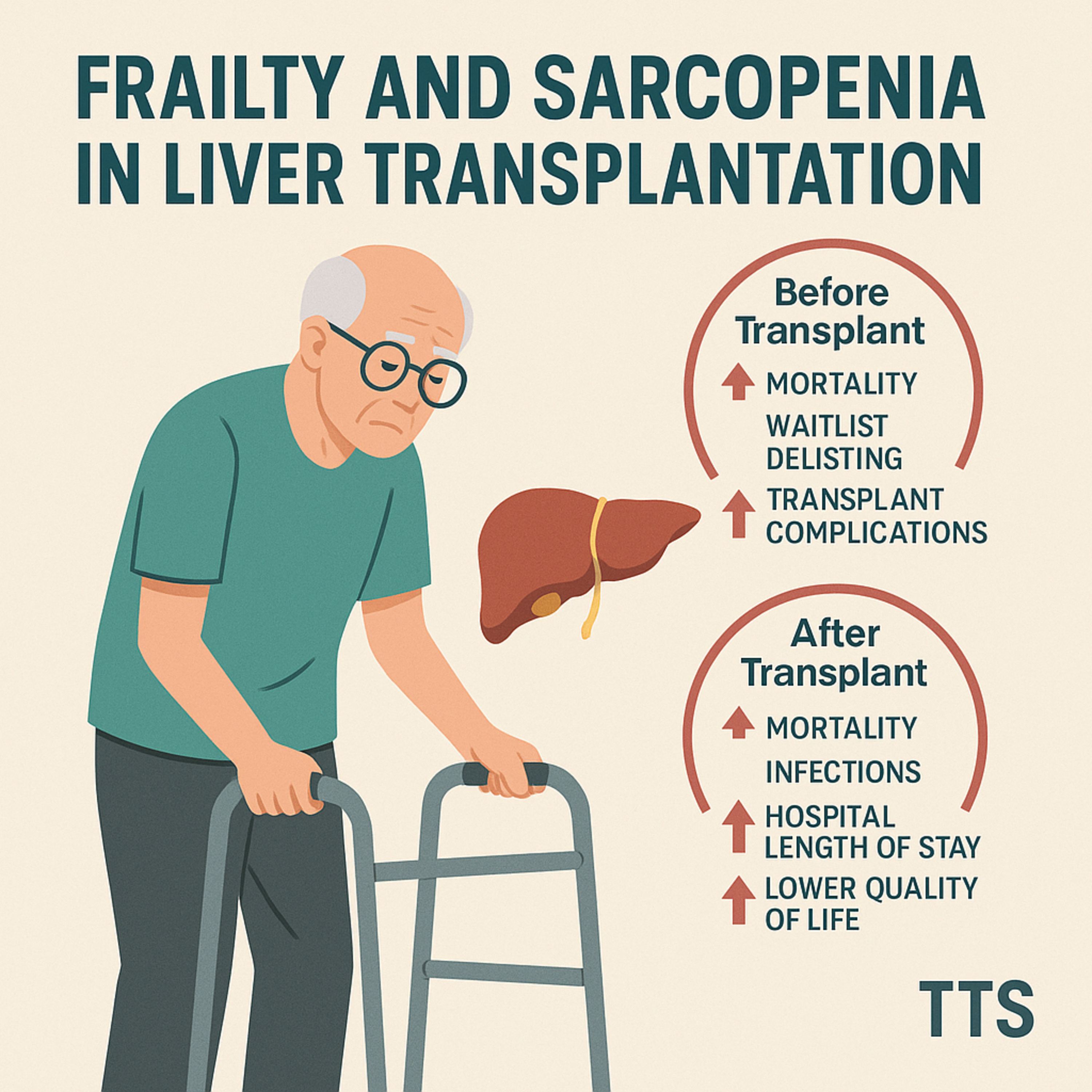
Trenches in Transplant SurgeryFrailty and Sarcopenia in Liver Transplant - Impact and ManagementFrailty and sarcopenia are highly prevalent in patients undergoing liver transplantation, with significant implications for both pre- and post-transplant outcomes. Frailty, often assessed using tools like the Liver Frailty Index (LFI), and sarcopenia, typically measured by CT-based muscle mass, independently predict increased waitlist mortality, longer hospital and ICU stays, higher risk of infections, and reduced post-transplant survival. These conditions often persist or worsen after transplant, especially without targeted intervention. Risk factors include advanced age, malnutrition, decompensated cirrhosis, and alcoholic liver disease. Recent studies emphasize the value of prehabilitation—combining exercise and nutritional support—to reverse or mitigate these risks, whil...
2025-07-0819 min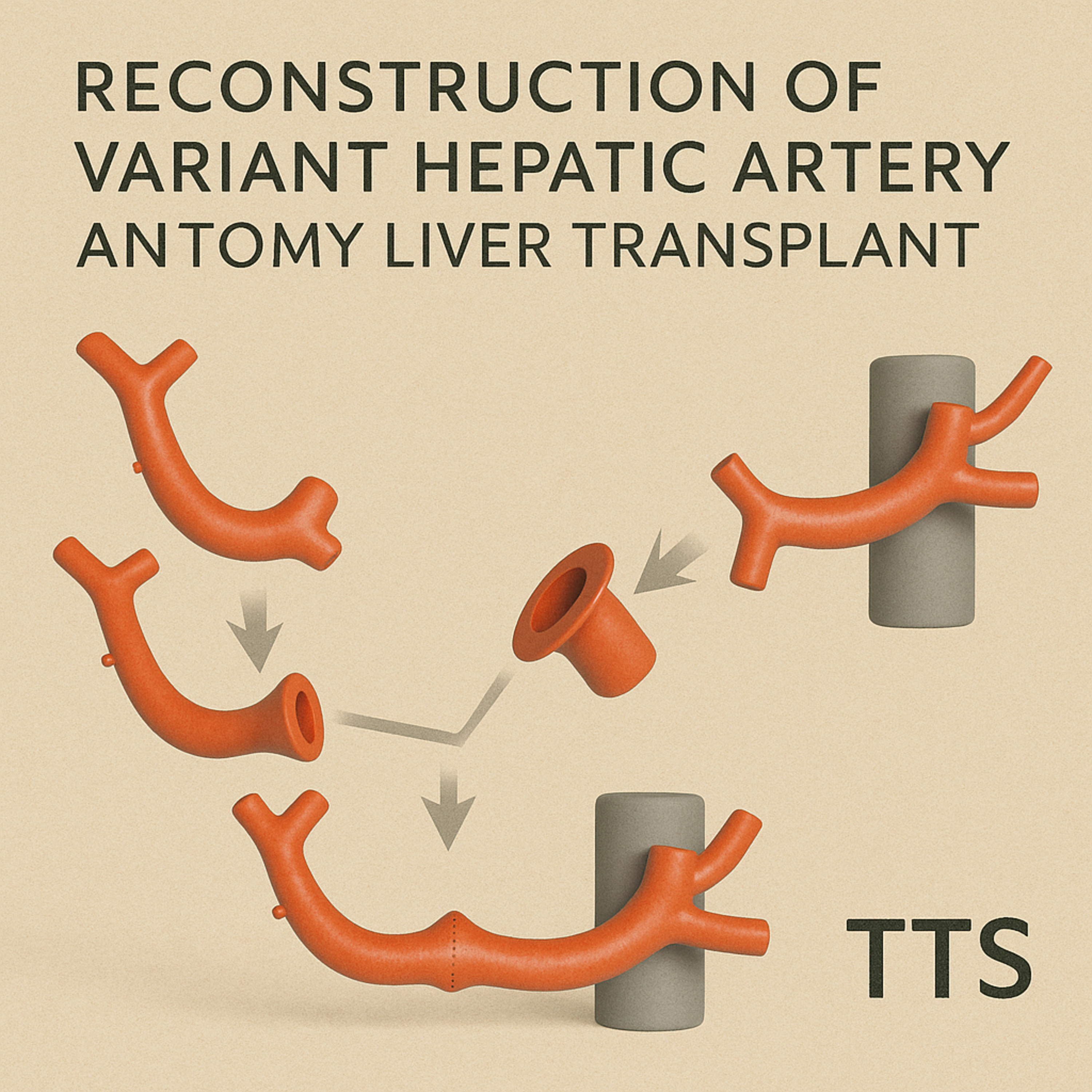
Trenches in Transplant SurgeryHepatic Artery Variants in Liver TransplantationReconstruction of variant hepatic artery anatomy during liver transplantation is a critical component of graft revascularization, given that up to 50% of donors exhibit anatomical variations such as replaced or accessory right or left hepatic arteries. Techniques include back-table reconstructions using Carrel or branch patches, end-to-end anastomoses, or grafting variant arteries to donor gastroduodenal or splenic artery stumps. When recipient arterial inflow is inadequate, alternatives like aortohepatic conduits or splenic artery inflow are employed, though with increased risk. In pediatric cases, microsurgical techniques are essential due to small-caliber vessels. While these reconstructions carry a slightly higher risk of hepatic artery...
2025-07-0725 min
Trenches in Transplant SurgeryBlockchain for Organ Tracking and Registry ManagementBlockchain technology offers a promising solution to critical challenges in global organ transplant systems, such as lack of transparency, data tampering, and inefficiencies in organ tracking and registry management. By providing a decentralized, immutable, and auditable ledger, blockchain can enhance trust among stakeholders, ensure the integrity of consent and allocation processes, and prevent fraud or manipulation. Emerging pilot projects in countries like the U.S., Sri Lanka, and Korea have demonstrated blockchain’s potential for smart-contract-driven donor-recipient matching, real-time organ traceability, and secure cross-border coordination. However, widespread adoption faces hurdles including regulatory uncertainty, data privacy concerns, interoperability with legacy sy...
2025-07-0624 min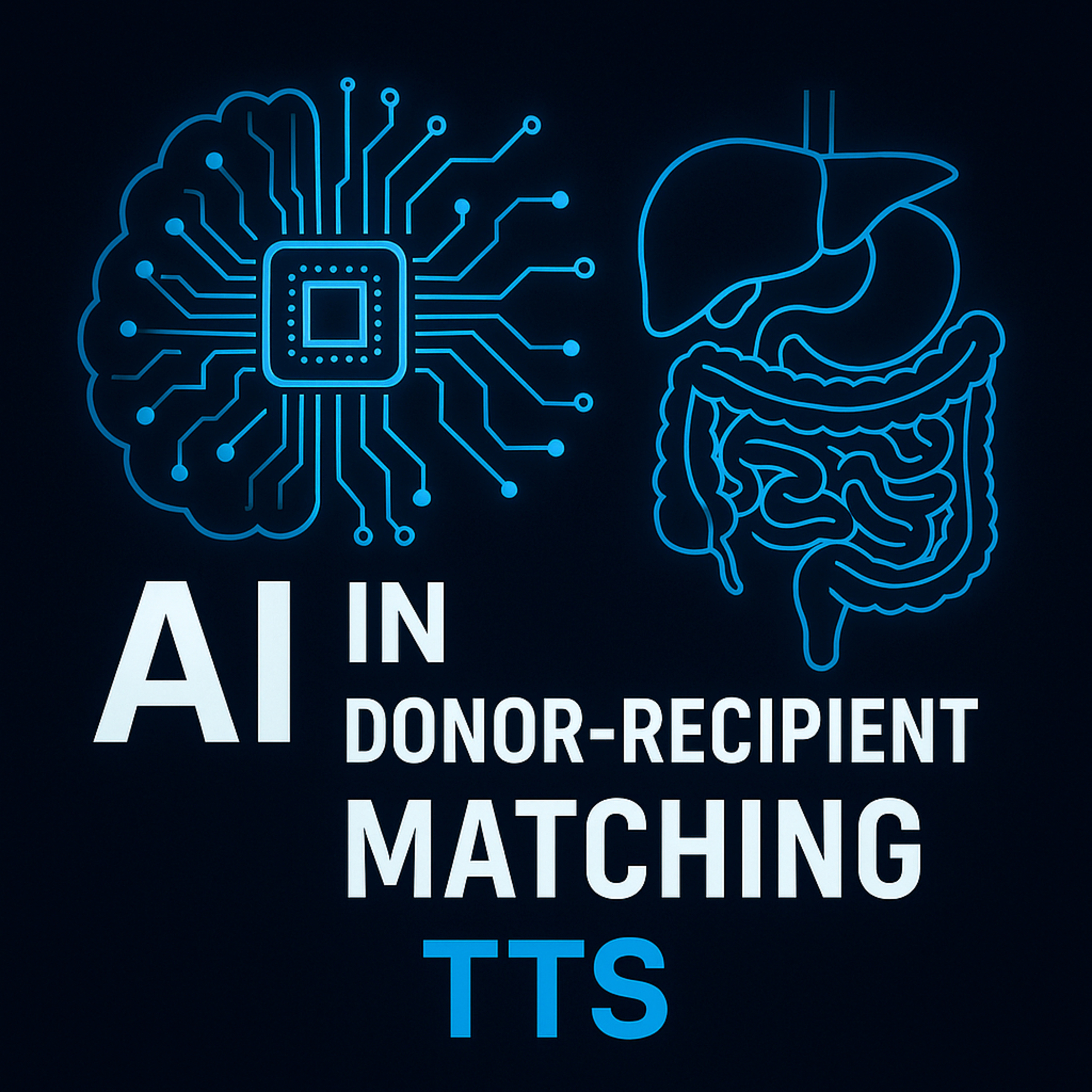
Trenches in Transplant SurgeryAI in Transplant Donor-Recipient MatchingArtificial intelligence is transforming donor-recipient matching in abdominal organ transplantation by integrating complex datasets—such as clinical variables, imaging, genomics, and immunologic profiles—into predictive models that can optimize graft allocation and improve outcomes. Machine learning techniques like gradient boosting, random forests, and deep neural networks have demonstrated superior accuracy over traditional scoring systems in predicting graft survival, organ usability, and rejection risk. Studies in liver and pancreas transplantation have shown AI’s ability to personalize matching decisions, reduce organ discard rates, and potentially increase graft longevity. However, challenges remain in terms of data quality, model interpretability, bias mitigation, and cl...
2025-07-0519 min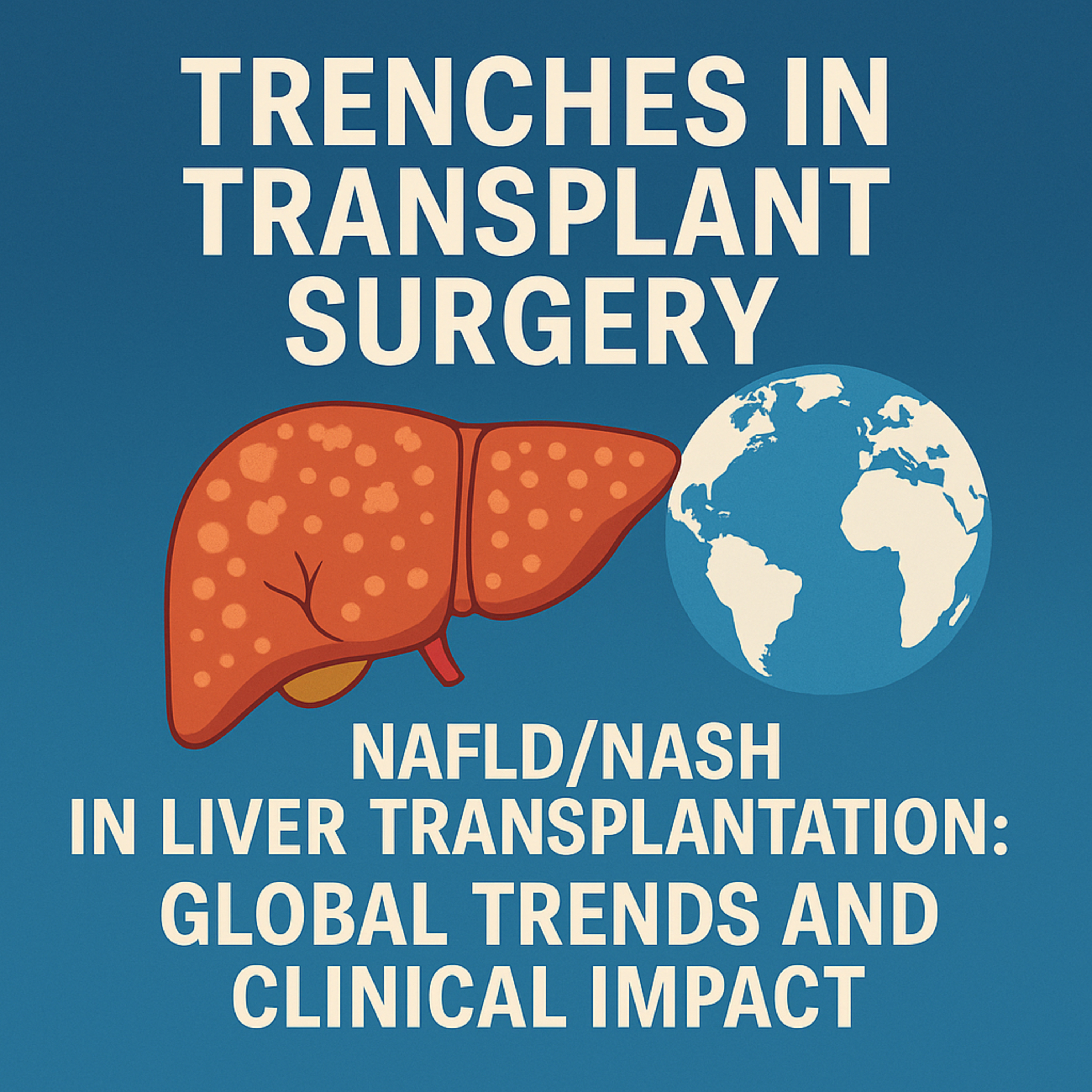
Trenches in Transplant SurgeryNAFLD/NASH in Liver Transplantation: Global Trends and Clinical ImpactNAFLD/NASH epidemic has two-fold impact on transplantation: it threatens the donor supply (steatotic grafts have higher risk) and creates a new high-risk recipient population (with metabolic complications and graft steatosis). Recent consensus and meta-analytic data emphasize using donor livers with ≤30% macrosteatosis whenever possible, careful evaluation with advanced imaging (CAP, CT) and possibly machine perfusion for high-fat grafts. Post-LT, aggressive control of weight and cardiometabolic factors is needed to prevent graft fattening and cardiovascular events.
2025-07-0418 min
Trenches in Transplant SurgeryA Century of Surgical Progress in Kidney TransplantationOverall, the surgical technique of kidney transplant has evolved from its early open forms to incorporate modern minimally invasive technology, but the core principles remain: precise vascular suturing and a secure ureteral reimplantation. Major contributors include Joseph Murray (Brigham Hospital, Boston) and colleagues (first transplants), Folkert Belzer (UW solution), Lloyd Ratner (laparoscopic nephrectomy), and many centers such as Cleveland Clinic and Johns Hopkins that pioneered robotics. Today’s transplant surgery reflects a century of innovation in anatomy, immunology and technology, with ongoing refinements (e.g. better perfusion devices, advanced robotics) continuing to improve outcomes.Ma...
2025-07-0315 min
Trenches in Transplant SurgeryClassical Versus Piggyback Techniques in Liver TransplantationThe evolution of liver transplantation techniques has shifted from the classical (conventional) approach, which involves removal of the retrohepatic inferior vena cava (IVC) and typically requires veno-venous bypass, to the piggyback technique, which preserves the recipient’s IVC and offers improved hemodynamic stability. While the classical method remains useful in complex cases (e.g., IVC thrombosis, Budd–Chiari syndrome), the piggyback approach has become the preferred standard due to reduced operative time, lower blood loss, avoidance of VVbypass, and equivalent long-term graft and patient survival. Advances such as modified piggyback techniques and improved intraoperative imaging have further optimized outcomes. Toda...
2025-07-0212 min
Trenches in Transplant SurgeryOmics Technologies in Kidney and Liver Transplantation - Enabling Precision ImmunosuppressionThe past 5–10 years have witnessed remarkable progress in applying genomics, proteomics, and metabolomics to kidney and liver transplant medicine. Genomic tools are uncovering polymorphisms and gene expression signatures that predict rejection or identify tolerance, as well as informing tailored drug dosing. Proteomic studies have yielded noninvasive protein biomarkers (chemokines, injury molecules) for early rejection detection and provided mechanistic insights into how rejection alters graft metabolism and immunity. Metabolomic profiling has revealed distinctive metabolic fingerprints of rejection – such as alterations in amino acid, bile acid, and energy pathways – and even suggested metabolites that correlate with tolerant immune states. These omics advanc...
2025-06-3020 min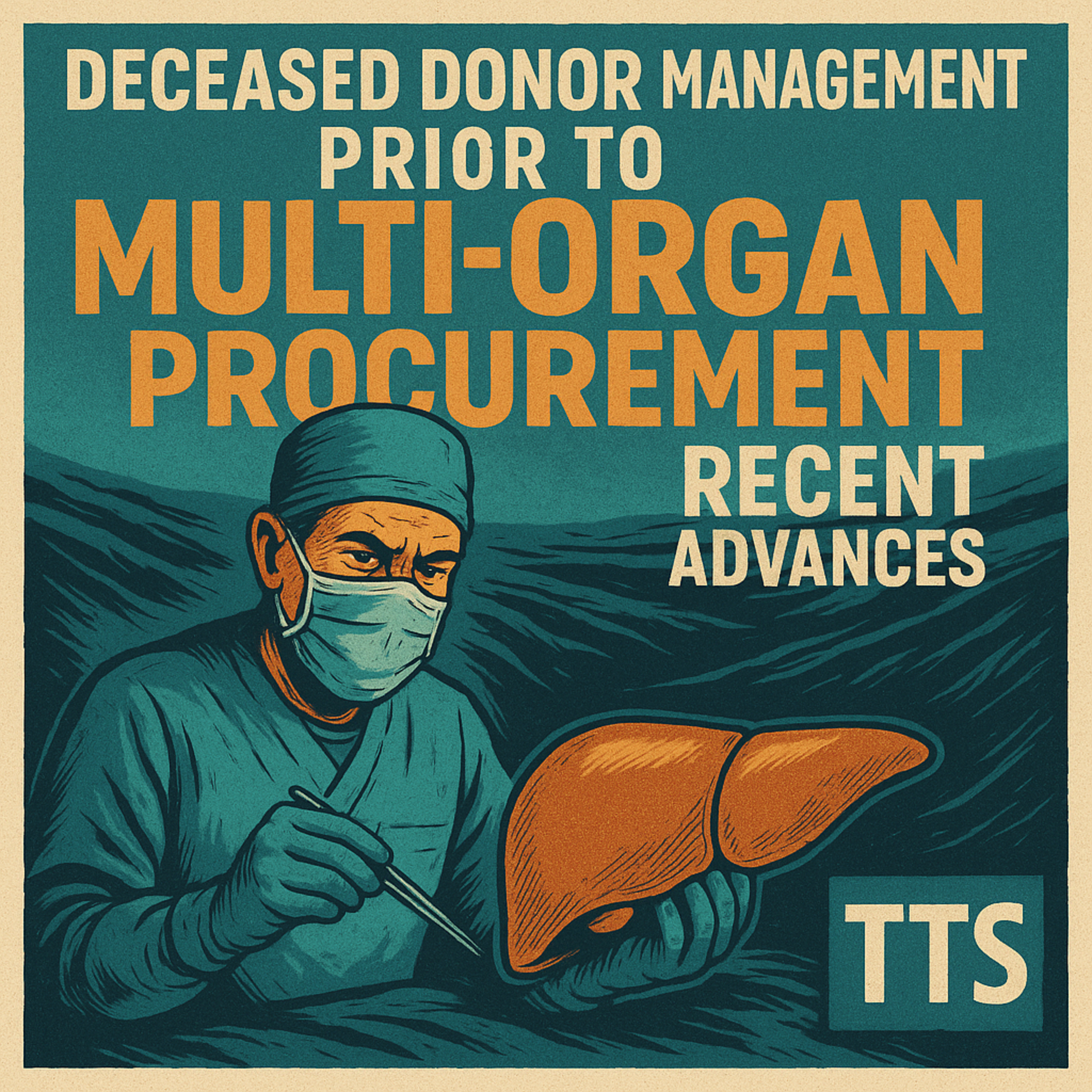
Trenches in Transplant SurgeryDeceased Donor Management and EvaluationDeceased Donor Management and EvaluationPhase 3 (donor evaluation) and Phase 4 (ICU donor management) are pivotal in the deceased donation pathway, directly impacting how many and how well organs can be transplanted. Recent years have seen significant progress: standardized donor management protocols, better understanding of pathophysiology after brain death, and technological innovations all contribute to improved outcomes. By thoroughly evaluating each organ with modern diagnostics and diligently optimizing the donor’s physiology (in both adult and pediatric donors), critical care and OPO teams can increase the availability of viable organs while upholding the highest ethical stan...
2025-06-2830 min
Trenches in Transplant SurgeryZimislecel - Stem Cell Therapy for Type 1 DiabetesThis podcast presents an original article detailing a phase 1-2 clinical study called VX-880-101 FORWARD, which investigates zimislecel as an allogeneic stem cell-derived islet-cell therapy for type 1 diabetes. The research aimed to assess the safety and efficacy of this new treatment, particularly its ability to restore physiologic islet function and potentially lead to insulin independence. The methods section outlines the study design, participant eligibility, and dosage regimens for zimislecel, administered via a single portal vein infusion, along with immunosuppressive therapy. Results from 14 participants demonstrate engraftment and islet function, with most participants showing freedom from severe hypoglycemic...
2025-06-2715 min
Trenches in Transplant SurgeryAnesthetic Management in Liver TransplantationLiver transplantation demands meticulous intraoperative management tailored to each surgical phase. By anticipating the typical hemodynamic changes in the pre-anhepatic, anhepatic, and neohepatic phases, the anesthesia and surgical teams at high-volume centers can proactively mitigate risks. In the pre-anhepatic phase, controlling bleeding (often by keeping CVP low and employing rapid transfusion protocols) and maintaining perfusion is paramount. In the anhepatic phase, preserving hemodynamic stability during IVC clamping (using piggyback techniques or veno-venous bypass if needed) and managing rising acidosis/coagulopathy keep the patient primed for graft reperfusion. The neohepatic phase requires vigilance and aggressive intervention during reperfusion, treating post-reperfusion...
2025-06-2737 min
Trenches in Transplant SurgeryMinimizing Immunosuppression and Achieving Tolerance in Liver TransplantImmunosuppression minimization and withdrawal in liver transplantation is an area where clinical practice and cutting-edge research intersect. The driving rationale is clear – mitigating the long-term deleterious effects of chronic immunosuppressive therapy – but the execution requires navigating complex immunological and ethical terrain. Over the past two decades, we have learned that operational tolerance, once deemed a rare curiosity, is attainable in a meaningful subset of liver recipients, particularly under ideal circumstances. Pioneering trials in both adults and children have mapped out the possibilities and pitfalls: some patients can indeed thrive off medication, whereas others cannot. This heterogeneity has propelled the sear...
2025-06-2523 min
Trenches in Transplant SurgeryLiver Viability Testing with Ex Vivo Machine PerfusionEx vivo machine perfusion has ushered in a new era where a liver graft’s viability can be tested before the irreversible step of transplantation. Both normothermic and hypothermic perfusion techniques play roles in modern liver preservation, with NMP in particular enabling real-time functional evaluation. Key viability markers – lactate clearance, perfusate pH, glucose consumption, transaminase release, perfusion flow dynamics, bile production, and bile composition – have been identified through extensive research and are now applied in clinical decision-making. These markers, especially when considered together, correlate with whether a liver will function or fail after transplant. Clinical trials over the last decade...
2025-06-2420 min
Trenches in Transplant SurgeryTransplant Tourism - Ethics, Illicit Trade, and Global EffortsTransplant tourism sits at the troubling intersection of medical need and global inequality. On one hand, it underscores the desperation of patients willing to do anything for a life-saving organ; on the other, it exposes the plight of the poor who are driven (or coerced) to literally sell parts of their bodies. The ethical global practice of transplantation demands that life be preserved without sacrificing human rights or dignity. The international community – through the WHO, the Declaration of Istanbul, the UN, and various national initiatives – has recognized transplant tourism and organ trafficking as urgent issues and has taken steps to c...
2025-06-2322 min
Trenches in Transplant SurgeryNRP Cannulation techniques and Blood Conservation during NRPA-NRP utilizes extracorporeal membrane oxygenation (ECMO) technology, including a pump, oxygenator, and heater, to maintain normothermic (37°C) blood flow to abdominal organs in situ. This process reverses warm ischemic damage, improving organ quality for transplantation. However, simultaneous procurement of thoracic organs, such as lungs, can lead to significant blood loss in the chest, compromising circulatory support for abdominal organs. Blood conservation techniques are thus essential to ensure adequate perfusion and maintain organ function. This podcast discusses about both cannulation techniques TA-NTP and A-NRP
2025-06-2213 min
Trenches in Transplant SurgeryLiver Enzyme Elevation Post Transplant - Causes, Workup and Treatment Elevated liver enzymes after a liver transplant can stem from various causes, including surgical complications, infections, or rejection, with no single definitive source. Workup involves blood tests, imaging like ultrasounds, and sometimes biopsies to identify the cause, though outcomes can vary. The evidence leans toward treatments being tailored to the specific cause, such as medications for infections or procedures for blockages, but effectiveness depends on timely diagnosis.
2025-06-2115 min
Trenches in Transplant SurgeryAI and Deep Learning in Liver Transplantation• Research suggests AI and deep learning are enhancing liver transplant outcomes.• It seems likely that donor-recipient matching and post-transplant predictions are improving.• The evidence leans toward AI helping with organ allocation and surgical innovations.• Challenges include data quality and validation, with ongoing efforts to address them.
2025-06-2013 min
Trenches in Transplant SurgeryViral Infections in Organ Transplant - Updates and Management Research suggests EBV is a significant risk post-transplant, with PTLD incidence at 4-22% in children and 1-2% in adults, higher in EBV-negative recipients. It seems likely that CMV remains the most common viral infection, with varying incidence based on donor/recipient status. The evidence leans toward BK virus being a major concern for kidney transplants, with no effective prophylaxis. HHV8 is linked to Kaposi’s sarcoma, with higher incidence in endemic areas (3-5%). Diagnosis typically involves PCR and clinical symptoms, with treatment often including reducing immunosuppression and antivirals like ganciclovir. Recent 2025 updates highlight a 22% PTLD risk in EBV-negative kidney recipients from EBV-posit...
2025-06-1913 min
Trenches in Transplant SurgeryBiliary Dilemmas in Liver Transplants• Ductopenia is mainly caused by chronic rejection, where the immune system attacks the bile ducts. Ischemic cholangiopathy, on the other hand, comes from poor blood flow, like when the hepatic artery is blocked.• Research shows ischemic cholangiopathy can lead to ductopenia by causing bile duct damage that results in their loss, but ductopenia can also happen from rejection, not just ischemia.• The evidence leans toward both conditions causing cholestasis and potentially needing retransplantation, but they differ in primary causes and diagnosis methods.
2025-06-1813 min
Trenches in Transplant SurgerySolving the Liver Organ Shortage - Strategies and Innovations• Research suggests increasing public awareness and opt-out donation systems can boost liver donations, though effectiveness varies by region.• It seems likely that using extended criteria donors and split liver techniques can expand the donor pool, but outcomes may differ.• The evidence leans toward machine perfusion and bioengineered livers as promising innovations, though they are still experimental.• Policy changes, like optimizing allocation, may help, but face ethical debates; living-donor transplants show potential with support.
2025-06-1715 min
Trenches in Transplant SurgeryLiver Transplantation for Hepatic Tumors• Research suggests hepatocellular carcinoma (HCC) is the most common liver tumor considered for transplantation, with specific size and spread criteria.• It seems likely that cholangiocarcinoma and colorectal liver metastases (CRLM) may be considered in select cases, but this is less common and debated.• The evidence leans toward strict criteria, like the Milan criteria, to ensure successful outcomes, though some centers use expanded guidelines.
2025-06-1622 min
Trenches in Transplant SurgeryThomas Starzl - Father of Liver Transplantation• Thomas Starzl is widely regarded as the father of liver transplantation, based on his pioneering work.• He performed the first human liver transplant in 1963 and the first successful one in 1967.• Starzl developed key immunosuppression techniques, like cyclosporin, improving transplant success rates.• His research on chimerism and animal-to-human transplants has shaped modern transplant medicine.
2025-06-1512 min
Trenches in Transplant SurgeryLiver Transplant Complications - Review• Research suggests liver transplant complications include infections, biliary issues, and rejection, with varying incidence rates.• It seems likely that infections, especially CMV, are very common early post-transplant, while biliary complications affect 15-20% of patients.• The evidence leans toward medication side effects, like high blood pressure and kidney issues, being significant long-term concerns.• Future challenges may involve managing recurrent diseases like NASH, with ongoing advancements in organ preservation and antiviral therapies.
2025-06-1421 min
Trenches in Transplant SurgeryDefatting liver during Machine PerfusionResearch suggests defatting livers during machine perfusion can improve transplant outcomes, but it’s still being studied. It seems likely that drugs like forskolin and L-carnitine help reduce liver fat, with early studies showing promise. The evidence leans toward machine perfusion, especially normothermic, being a key method for defatting, though more research is needed.
2025-06-1220 min
Trenches in Transplant SurgeryRevolutionizing Liver Transplantation: Machine Perfusion and NRPUnderstand the Mechanisms and Benefits: Explain the principles of machine perfusion (hypothermic and normothermic) and normothermic regional perfusion (NRP), and evaluate their roles in improving liver preservation and transplantation outcomes. Analyze Clinical Impact and Challenges: Assess the clinical benefits of machine perfusion and NRP in expanding the donor pool and reducing complications, while identifying key challenges such as cost, training, and ethical considerations in their implementation.
2025-06-1226 min
LOVE MUFFINAnswering lifes deepest and toughest question rakha haiWe answer some questions from the Subreddit r/nostupidquestions.
2020-08-2329 min
LOVE MUFFINAnswering Intriguing Questions about Men (Subreddit Review - r/askmen)We answer some questions from the Subreddit r/askmen
2020-07-0826 min
LOVE MUFFINFootball Draft (Creating a 15 man Team)In this episode, we all create the best 15 man team from the current active players in Football.
Music: https://www.purple-planet.com
2020-06-3038 min
LOVE MUFFINTraveling in NepalIn this episode, we talk about our traveling experiences and our must visit places. Music: https://www.purple-planet.com
2020-06-231h 10
LOVE MUFFINWhat is football for us?In this episode, we talk about what football means to us and what place does it hold.
Music: https://www.purple-planet.com
2020-06-161h 11
LOVE MUFFINThe Prestige: Best ever Christopher Nolan Movie?In this bonus episode, we discuss and try to review the movie, The Prestige, an absolute masterclass of a movie.
Music: https://www.purple-planet.com
2020-06-1028 min
LOVE MUFFINParanormal and the SupernaturalIn this episode of our podcast, we will discuss various incidents of paranormal and supernatural that we have heard of and have experienced.
Music: https://www.purple-planet.com
2020-06-0234 min
LOVE MUFFINTV series you should not missIn this episode of our podcast, we will discuss various TV series that are our favorites and we will also recommend a must-watch series.
Music: https://www.purple-planet.com
2020-05-2635 min
LOVE MUFFINThe best cricket match ODI has ever seen (England Vs New Zealand: World Cup 2019 Final)In this episode of our podcast, we will discuss, one of the all-time best ODI cricket matches that was played in the biggest stage of the Cricket World Cup Final.
Music: https://www.purple-planet.com
2020-05-2033 min 2020-05-1900 min
2020-05-1900 min